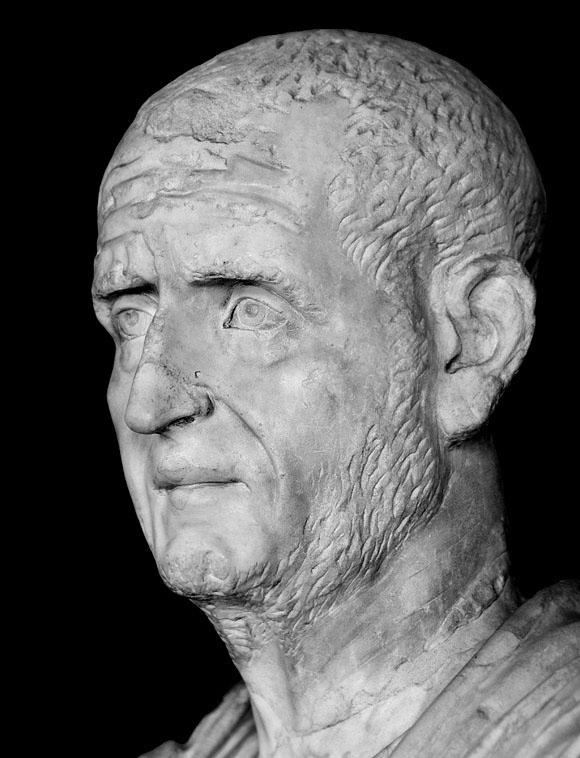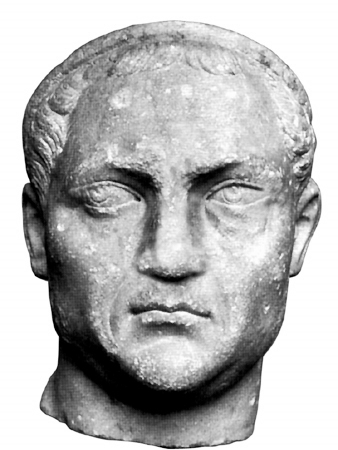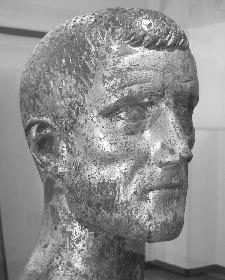|
A Timeline of Major Events during this period
BC
44 Julius Caesar is murdred at a meeting with the Senate
42 Caesar's great nephew (and adoptive son) Octavian joins forces with Marc Antony ... and at the Battle of Philippi with 17 legions) defeat the army (19 legions) of those responsible for Caesar's death
Octavian takes
leadership in the Western half of the Empire based in Rome ... Marc
Antony leads the Eastern half, from his base in Alexandria, Egypt
33 Marc Antony divorces his wife (Octavian's sister) to marry Cleopatra, embittering Octavian
31 Octavian and Marc Antony meet in battle at Actium ...Octvian is victorious
30 Marc Antony and Cleopatra choose suicide rather than be paraded as prisoners in Rome
29 All of Rome comes under Octavian "Augustus" Caesar (29 BC - AD 14)
The Roman Empire is thus born
AD
14 Octavian's step-son Tiberius takes power (14-37), an excellent general ... but increasingly
paranoid as Rome's emperor (killing many of those close to him)
41 His grandnephew Caligula was insane ... and assassinated after only 4 years of rule (37-41)
He is replaced by his
uncle Claudius (41-54) ... Claudius put in power by the Praetorian Guard... supposedly imperial body guards, but taking on the role as
emperor-makers
43 Claudius begins the actual conquest of Britain
54 A paranoid Claudius is poisoned ... over the matter of his successor
Nero, Claudius's young (only 16) adopted son becomes emperor (thanks to his mother) ...
also eventually proving to be paranoid and murderous
60 Queen Boudica inspires a massive British revolt against Roman domination ... but Rome crushes the revolt the next year (61)
64 Rome burns widely ... and Nero turns cruelly on the Christians to deflect blame directed against him for the fire
65 Nero orders the philosopher Seneca to take his own life
68 Seeing that he has lost all support, a young Nero commits suicide ... ending the Julio-Claudian imperial line
69 After four years of military conflict over emperorship, General Vespasian emerges as the
victor ... having crushed a massive Jewish revolt (67-69)
Vespasian turns out to be an excellent administrator (69-79)
79 His son Titus briefly becomes emperor (dies in 81) ... at a time that Mount Vesuvius erupts and destroys the city of Pompeii (79) ... and Rome undergoes another
huge fire (80)
81 His brother Domitian becomes emperor (81-96); balances his government's finances by
seizing the property of this opponents; offers the commoners "bread and
circuses"
98 Trajan (98-117) brought to power by his military ... which he also uses to extend Roman power deep into Persian territory; he faces another Jewish rebellion;
dies exhausted
117 Hadrian (117-138) is chosen to succeed Trajan; Hadrian returns territory to the Parthians (Persians) but holds the line in Britain against invading
Scots (Hadrians' Wall - 122)
138 Hadrian's devoted follower, the non-military Antoninus Pius (138-161), comes to power ... and gives Rome a long period of peace as an excellent administrator
150? Mathematician Claudius Ptolemy publishes his Almagest ... carefully calculating the movement of the heavens ... centered not on the sun (heliocentrism) but on the earth (geocentrism)
161 Soldier-philosopher (Stoic) Marcus Aurelius (61-180) had ongoing problems with the
Pathians ... and Germanic tribes pushing against Rome's borders
180 Marcus Aurelius's son Commodus (180-192) inherits the emperorship ... developing
paranoia and becoming increasingly insane ... beginning the decline of
the Empire
181 Septimus Severus (181-211) defeats other armies in order to take power ... and finds himself absorbed in fighting the Parthians and the Germanic tribes ...
and extending his power into Scotland – rather successful on all counts ... but exhausting Rome in the process
211 Now Rome is afflicted with weak or rapidly changing leadership ... weakening Rome even further in the face of the continuing Parthian/Gemanic
problems ... the Praetorian Guards acting as emperor-makers rather than emperor-protectors
249 Emperor Decius (249-251) engages in intense persecution of the Christians ... who are growing in number across the Empire
250 The Philosopher Plotinus develops "Neo-Platonism" with his Six Enneads
253 Emperor Valerian (253-260) continues to face the Persian and Germanic threats ... and also
continues the harsh persecution of Christians ... many highly placed in
Roman society
270 Emperor Aurelian (270-275) briefly recovers some of Rome's lost power ... but too is assassinated by Pretorian Guard ambitions
285 Diocletian's troops bring him to power (285-305) as emperor ... who then divides Rome into four major adminstrative territories, each with their own leader (thus
a "tetrarchy") ... and comes down hard on non-pagan religions – first the followers of Mani, a bit of a spin-off from Christianity, and then on Christianity itself
305 Confusion results in the effort to continue the tetrarchy after Diocletian ... setting military contenders (and their sons) up against each other over the next years
312 Constantine defeats his contender for power in the Western half of the Empire
313 With the publication of the Edict of Milan by Constantine and his co-emperor, Licinius, all persecution of Christians comes to an end
324 Constantine defeats and executes Licinius ... making Constantine Rome's sole ruler
THE
BIRTH OF IMPERIAL ROME |
|
Julius Caesar (r. 49-44 BC).
Caesar's rule proved to be surprisingly generous in its response to his
opposition – and in his bringing his own followers in Rome to order.1
In his land allotment to his soldiers he opened new lands – colonies in
Carthage (Africa) and Corinth (Greece) – rather than confiscate land
from his opponents. He tightened up on the administration of the
wheat dole and the number of public events that had made him once so
popular with the Roman masses. Towns in decline in Italy were
rebuilt and resettled and labor was opened up to the many unemployed
commoners. He established the new Julian calendar,2
regularized the public administration, straightened out the treasury,
and removed a great deal of corruption among public officials.
And for himself, he acknowledged only his title as imperator3
– head of the Roman military. But the old constitution still remained
in force – even as it accepted this new approach to governance (but not
unprecedented – as in Sulla's dictatorship). Thus although Rome
continued to present itself as a constitutional Republic, Caesar ran
the government personally and totally.
But
he mistakenly believed that he had finally won the hearts of the
Senators. And thus, just as Caesar was about to depart for the East to
fight the troublesome Parthians (March 44 BC) – and despite warnings
not to do so – he presented himself before the Senate ... only to be
assassinated by those he thought were his friends. Supposedly
this plot was undertaken to save the Republic. But in fact, all
that these senators achieved was chaos in Rome … and the need for
another strong figure to take control – so as to bring Rome back to
good order.
The Republic was now dead … even though Rome would continue to call itself a "Republic."
Civil war.
Again Cicero tried to organize the pro-Republican sentiments among the
people. But Rome was deeply divided in sentiment over the
restoration of the old Republic. In the meantime, Marc Antony
took up the cause of avenging Caesar. Also Octavian Augustus
Caesar (63 BC - AD 14), the 20-year-old great nephew (adoptive heir) of
Caesar, recently elected consul, soon joined forces with Antony – after
a period of bitter rivalry – in 43 BC). The following year they
gathered a huge army (17 legions) and took on the "Liberators"
responsible for Caesar's death (defended by 19 legions) … with Octavian
and Antony ultimately victorious at the Battle of Philippi (in
Macedonian Thrace).
Antony and Octavian thus divided the empire between them, the East
going to Antony and Italy and the West going to Octavian. Upon
that agreement, Antony (who had married Octavia, Octavian's sister in
40 BC as part of their alliance) proceeded to settle into Eastern
cultural ways – in company with Egyptian queen Cleopatra – by whom
Julius Caesar supposedly had previously fathered her young co-ruler
Caesarion ... and by whom March Antony fathered three more
children! Thus it was that Marc Antony took up Alexander's old
dream of instituting a "divine" imperial rule over the East.
Octavian
meanwhile consolidated his political position in Rome. Then when
Sextus Pompey, son of Caesar's old rival – who had tried and failed to
challenge Octavian in the West – died in 35 BC, this finally left
Octavian unchallenged in the West.
Soon Octavian turned to matters in the East. Mark Antony divorced
Octavia in order to marry Cleopatra (33 BC) – more a political than a
sexual matter actually – effectively ending his alliance with
Octavian. Seeing how this was designed to increase the power of
both Marc Antony and Cleopatra, Octavian decided that it was time to
fight. The two met in a huge naval battle at Actium in 31 BC … with
Octavian the winner. Then with Octavian advancing on Egypt, Marc
Antony and Cleopatra ultimately (30 BC) chose suicide rather than
public humiliation. This ended Ptolemaic rule in Egypt … as Egypt
now came under Octavian's direct rule (29 BC).
1
So important did the family name "Caesar" become, that it came to be
used simply as a title of authority by Roman rulers … all the way down
to the 20th century, when Russian rulers were called Czars or Tsars –
simply a Russian rendering of the name Caesar – in the same way the
German emperor was called the Kaiser.
2This
replaced the previous Roman calendar based on 12+ annual lunar cycles,
reallocating days of the lunar calendar, plus adding an additional day
in February ("leap year") to compensate for solar drift. This
would remain as the West's calendar up until 1582, when Pope Gregory
XIII put the new Gregorian calendar into effect – simply accounting for
the slight drift over the centuries … thus, for instance, the 13 days
difference between the Julian and Gregorian calendars as of today –
with the Julian calendar still being used by the Eastern Orthodox
Church!
3The words "emperor" and "empire" are simply modern English's translation of the ancient Latin imperator and imperium.
In short, an "empire" (imperium) is a society built on the power of its
military and its military commanders (imperators) – as so many
societies even today find themselves. They may not be huge
"empires," but they are definitely run by the military … … as was the
First French Empire under its Emperor Napoleon Bonaparte (1804-1815)!
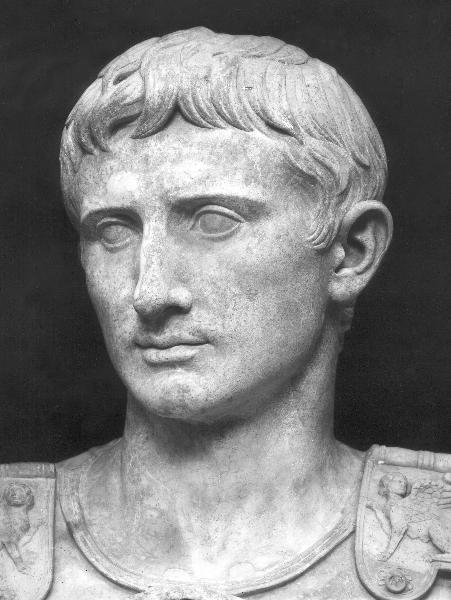
Octavian Caesar
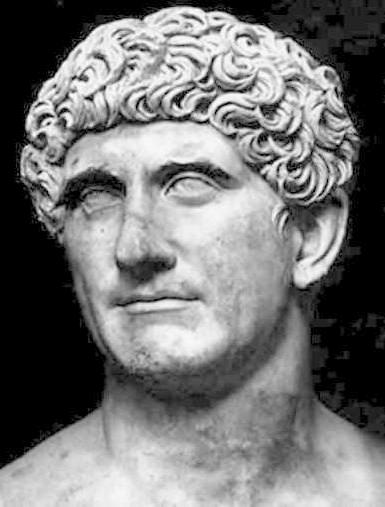
Marc Antony
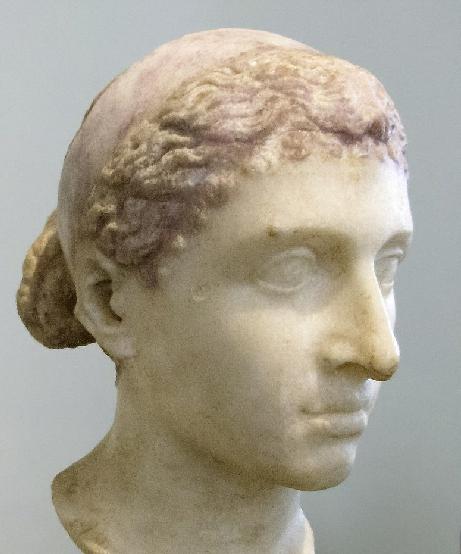
Cleopatra VII
|
Octavian "Augustus" Caesar builds all Roman power around himself as "Emperor"
Two
years later (27 BC) Octavian presented a plan for a restored Republic
with powers supposedly returned to the Senate and the people of
Rome. But his reforms of the Roman constitution did quite the
opposite, by turning over to Octavian all major public offices.
He took for himself the title of "princeps," an old title not unknown
to the Republic, and also the designation as augustus.4
In that same year the Senate accorded him for a 10-year period (renewed
several times) oversight of the Imperium as commander-in-chief of the
Roman Army. He also took for himself the civil title of Tribune (tribunicia potestas)
– to broaden the look of his power base so that it appeared as if it
had a traditional Republican foundation as well as just a military
foundation.
Then
in 23 BC he let the older, formerly more important title of consul
lapse ... but retained the military title of imperator for himself – a
clear indication that the military position over the imperium was much
more important than the old leadership position of consul. Thus
it came to be that it was not the constitution, nor the Senate that
mattered most in the new regime, but it was solely the military and its
role in Roman public life that now stood behind all Roman public
power.
And thus Rome as "Empire' was born.
Also
in 12 BC, when an old political ally died, his priestly position as
pontifex maximus was taken up by Augustus. He was careful to
avoid trying to appear in Rome as a mystical ruler, a representative of
the gods. But he easily took up that role in the East where that
was exactly what was expected of their rulers. Eventually this
mindset would enter Rome itself — especially through the slaves brought
in in huge numbers from the East.
The deeper social impact of these changes
Unfortunately,
Octavian based himself on the power of the military at a time (just
about the time of Christ) when the military was depending less and less
on recruits from the Roman middle class and more and more on fortune
hunters drawn from conquered peoples. Their loyalties were less
to Rome than to their generals. Thus also – and most sadly –
under the new Imperial dynamic, it was often in rapid succession that
rising generals (emperors) would take command – as the military (or at
least military fortunes) made and unmade emperors at will. The
Roman public played no role in these developments.
Also,
the military needs and military expenses of the Roman Empire were
limitless. After a while there were no more rich neighbors for
Rome to plunder and the Empire had to rely on the resources of its own
people to pay for its ongoing and extravagant military ventures.
Mercenaries hired from Rome's former (or even continuing) enemies
replaced the patriotic free citizen-soldiers of Rome, the latter,
impoverished from too great a demand for their increasingly lengthy
term of military service, now falling into terrible poverty. Soon
the city's slums were filled with the once free citizen-soldiers and
their families. And thus the Empire lost touch with what it once
was.
True
... military governance acted to unify the Empire. But actually
it was the economic prosperity which Rome clearly brought its world
that kept human hearts loyal to the whole program.
At
first the new imperial system seemed to work well enough.
Octavian Augustus' long rule provided the sprawling empire with the
kind of stability needed for prosperity to become widespread
everywhere. By and large, revolts disappeared and the scene of
Roman legions gathering against each other to secure a change in
political leadership was no longer to be seen … for quite a long while.
Augustus' Successors: The Julio-Claudians (14-68 AD)
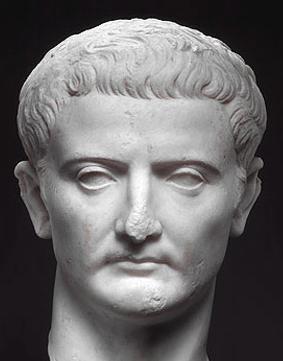 Tiberius (14-37 AD).
Tragically, those that followed Octavian did not have the same strength
of character. And Rome would suffer as a result. Tiberius
started out well. But with time, Tiberius descended into a highly
paranoid condition, executing many around him that he suspected of
personal disloyalty (including many of his personal relatives). Tiberius (14-37 AD).
Tragically, those that followed Octavian did not have the same strength
of character. And Rome would suffer as a result. Tiberius
started out well. But with time, Tiberius descended into a highly
paranoid condition, executing many around him that he suspected of
personal disloyalty (including many of his personal relatives).
His grandnephew Caligula (37-41 AD) was probably insane … and was soon assassinated..
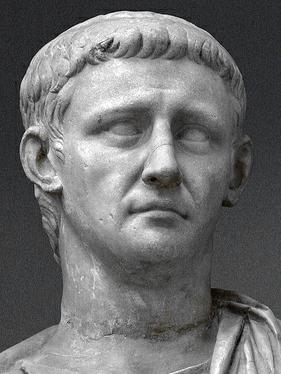 Claudius (41-54).
Caligula's uncle (and Tiberius's nephew) Claudius replaced him – just
as the Senate was giving thought to restoring the Republic. But
the army's Praetorian Guard (personal body guard of the Emperor)
stepped in and declared Claudius emperor – putting an end to the
matter. This would tragically mark the beginning of the role of
the Praetorian Guard as emperor-makers – as well as emperor "unmakers"
or assassins, according to their own political preferences.
Claudius too developed violent suspicions of those around him, in
particular a number of Senators. In AD 54 he was probably
poisoned – possibly by his wife (who was certainly afraid that he was
going to pass over her son Nero in favor of another imperial candidate). Claudius (41-54).
Caligula's uncle (and Tiberius's nephew) Claudius replaced him – just
as the Senate was giving thought to restoring the Republic. But
the army's Praetorian Guard (personal body guard of the Emperor)
stepped in and declared Claudius emperor – putting an end to the
matter. This would tragically mark the beginning of the role of
the Praetorian Guard as emperor-makers – as well as emperor "unmakers"
or assassins, according to their own political preferences.
Claudius too developed violent suspicions of those around him, in
particular a number of Senators. In AD 54 he was probably
poisoned – possibly by his wife (who was certainly afraid that he was
going to pass over her son Nero in favor of another imperial candidate).
Nero (54-68)
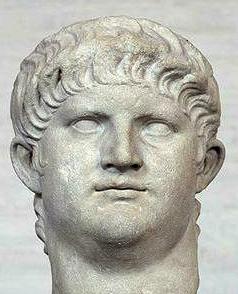 And
then there was Nero who, with the help of his conniving mother (whom he
would anyway execute in 59!), became emperor at age 16. He
started off his reign fairly popular with the people – whom he was
always trying to please. He did what he could to beautify Rome,
building theaters and sponsoring gladiatorial contests to amuse the
people. However, his projects grew increasingly extravagant and
became a serious burden on the finances of the Empire. Also,
arrogant and by nature suspicious, Nero became increasingly paranoid
and ruthless (even murderous) to a large circle of individuals
immediately around him, including his old tutor, Seneca. And
then there was Nero who, with the help of his conniving mother (whom he
would anyway execute in 59!), became emperor at age 16. He
started off his reign fairly popular with the people – whom he was
always trying to please. He did what he could to beautify Rome,
building theaters and sponsoring gladiatorial contests to amuse the
people. However, his projects grew increasingly extravagant and
became a serious burden on the finances of the Empire. Also,
arrogant and by nature suspicious, Nero became increasingly paranoid
and ruthless (even murderous) to a large circle of individuals
immediately around him, including his old tutor, Seneca.
In
64, much of Rome burned (actually not an entirely uncommon
occurrence). Rumors were that he himself had done this in an
effort to clear the Roman slums to make way for his expensive,
ever-expanding urban beautification projects. According to the
historian Tacitus, Nero attempted to deflect the blame for the fire
onto the Christians … who were growing rapidly in number in Rome – and
also gaining a bad reputation for their un-Roman "secret" ways.
He attempted to validate his own accusations against the Christians by
offering the Roman public the entertaining spectacle of horrible deaths
inflicted on members of this "vile sect."
On
the more positive side of the picture, during his reign he encountered
– and largely overcame – rebellions in various parts of the Empire,
most notably in Britain (Queen Boudica's Revolt of 60-61). Also,
Nero actually demonstrated diplomatic talent in the way he resolved a
dispute with Parthia (the former Persia) over the kingdom of Armenia
(63) and in securing a peace between these two empires that would last
50 years.
But
eventually revolt also touched the heart of Rome itself: Nero found
himself facing down rebellion and conspiracy – from many different
directions. Even the army was growing unreliable in its support
of him. Finally hearing of a major rebellion brewing, and finding
that no one supported him any longer, he took his own life (68).
He was only 30 years old at his death. And with his death the
Julio-Claudian line came to an end.
4A
term derived from the Latin, augere (to increase) and thus meaning
approximately "one who increases" … or "majestic" or "venerable."
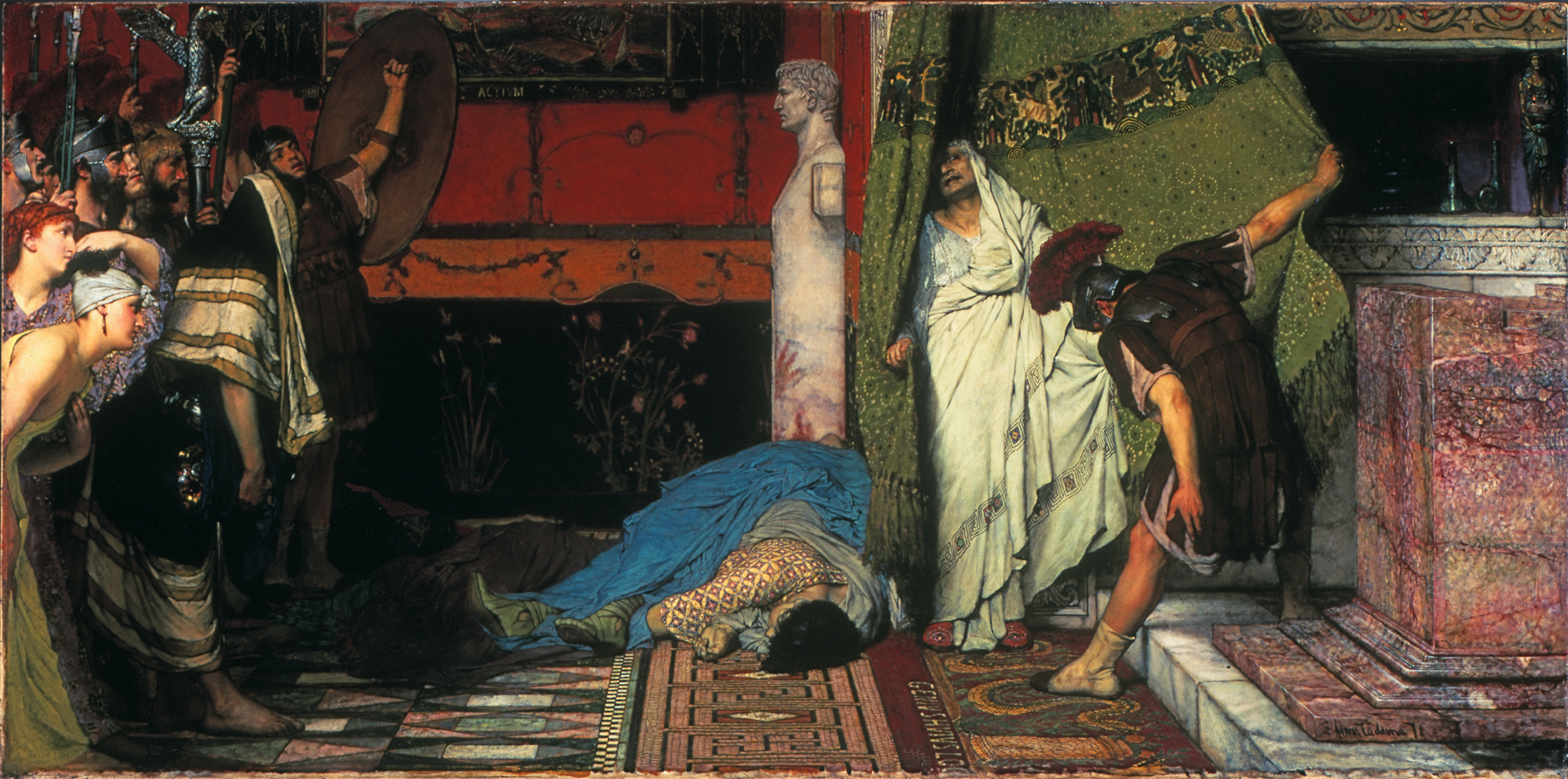
|
The assassination of Caligula (and his wife and daughter) by the Pretorian Guard (the first of many such instances) ... and the elevation by the same Pretorian Guard of a terrified Claudius (found hiding behind a curtain) to the position of Roman Emperor by Lawrence Alma-Tadema (1871)
|
THE
HEIGHT OF THE ROMAN IMPERIUM |
|
The Flavian Dynasty
(69-96)
With
no direct heir to the imperial title, and with Roman armies now more
personally loyal to their generals than to imperial authority, chaos
reigned throughout the empire. Four different emperors,
commanding four different armies, rose and fell in rapid succession in
the year and a half after Nero's death (68-69).
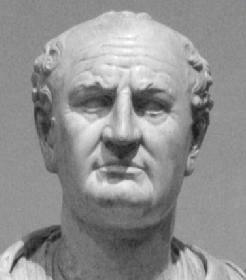 Vespasian (69-79).
Finally Vespasian – one of the Roman generals to have helped bring
Britain into the Roman Empire (43) during Claudius's reign, and the
leader of the Roman effort to crush the Jewish revolt which broke out
in 67 – was declared emperor by his troops in mid-69 and then by the
Senate in late 69. Vespasian (69-79).
Finally Vespasian – one of the Roman generals to have helped bring
Britain into the Roman Empire (43) during Claudius's reign, and the
leader of the Roman effort to crush the Jewish revolt which broke out
in 67 – was declared emperor by his troops in mid-69 and then by the
Senate in late 69.
He
proved to be as excellent an administrator as he had been a
general. He brought Roman public finances that Nero had
squandered back into order – even into surplus – by raising taxes and
by a closer oversight of how public funds were spent. He
broadened the sense of Roman politics and culture by extending to Spain
and Gaul rights and responsibilities that had previously belonged to
Italy alone. He recruited troops for the Roman legions from Spain
and Gaul – and mixed the composition of the legions, separated the
legions into smaller units, and based them more widely along the
frontiers so that the legions no longer represented the interests of
any particular region of the Empire. It also made it more
difficult for any particular individual aspiring to political power to
use the army for political purposes. He expanded
the membership of the Senate (depleted by the murderous policy of his
predecessors) from 200 to 1000, giving representation to new families
and the new regions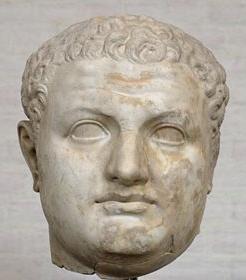 of the Empire he recently "Romanized." of the Empire he recently "Romanized."
Titus (79-81).
Vespasian's eldest son Titus succeeded his father as emperor. He
had distinguished himself under his father's rule as the commander of
the eastern legions that forced Judea back into submission. As
emperor his rule was short – and troubled. Pompeii was destroyed
by the eruption of Mount Vesuvius in 79 and in 80 much of Rome was
destroyed by fire. Otherwise he too was proving to be an
excellent administrator. But Titus died in 81 – seemingly of
natural causes.
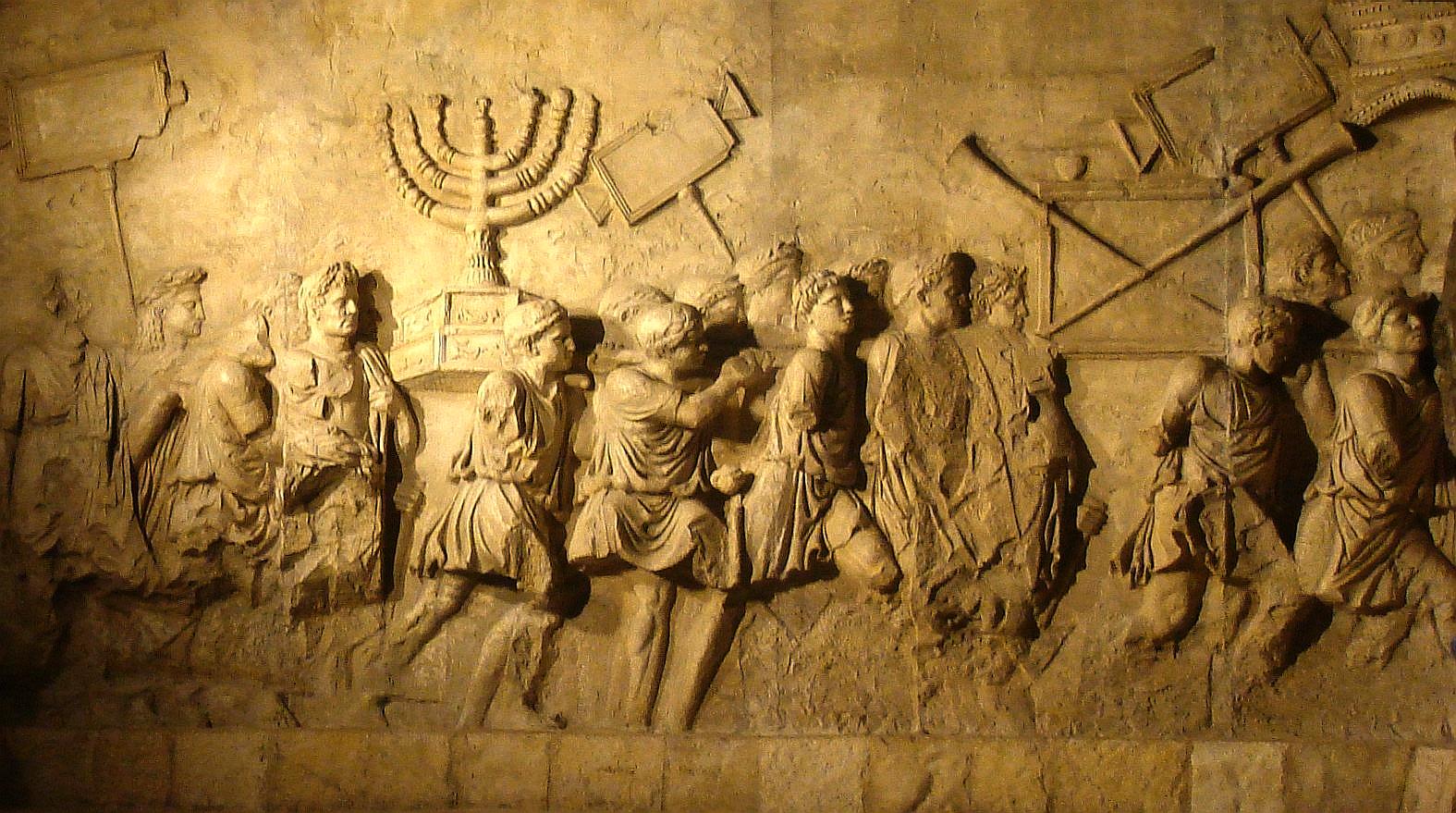 Titus's troops carrying off
plunder from the Temple of Jerusalem
Titus's troops carrying off
plunder from the Temple of Jerusalem
(From the Arch of Titus – Rome)
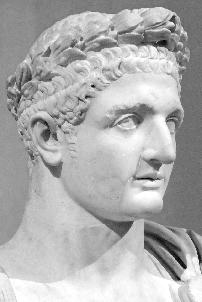
No effort was made to continue the pretense of the Republic's
existence. He ignored the Senate (which grew to hate him) and
surprisingly gave no special favors to his family, very unusual in
imperial politics. He presided over a tightly organized and
surprisingly uncorrupt bureaucracy. He spent most of his time
away from the capital city, leading battles or conducting inspection
tours … and thus the seat of his government tended to be wherever he
himself was located. It was during his emperorship that Celtic
Britain was finally defeated (by General Agricola) and brought into the
Roman Empire … except for the northern portions (Scotland) whose troops
managed to escape the grip of the Roman legions.
He cultivated the support of the crowds – with lavish gladiatorial
games in the new Coliseum and through distributions of monies to the
residents of Rome. Surprisingly, his regime ended with money
still in the state treasury, probably because of all the wealth he
accumulated by seizing the property of people he had begun to
fear. In 96 he was assassinated in a plot directed by his
own court officials. But in any case, this brought the
Flavian line to an end.
The era of the "Five Good Emperors" (96-180)5
The next century or so proved to be a time of relative peace and
prosperity – even what might be termed "the height" of the Roman
Empire. Five emperors peacefully succeeded each other – by the
previous emperor's adoption during his lifetime, as none but the last
of these five had a natural heir of his own. Thus the transfer of
power was based purely on a sense of true merit and not just family
interest. Rome benefitted greatly from this principle.
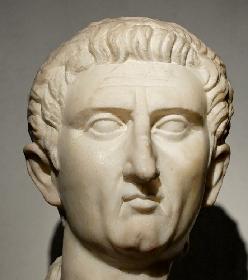 Nerva (96-98).
Nerva was raised in political, not military circles, and his accession
to power was via the Senate, where he was popular. He immediately
freed the people that Domitian had imprisoned and restored to them
their property he had confiscated. He also attempted to cultivate
popular support in Rome through the lowering of taxes and extensive
welfare grants to the poor. But this created financial problems
for the government. Also Domitian had been popular with the Roman
army. In fact, the Praetorian Guard seized Nerva and forced him
to turn over to them the individuals involved in the death plot against
Domitian. Nerva's rule was brief – he was probably chosen by the
Senate because he was old and childless – and he died of a stroke after
only two years of rule. Nerva (96-98).
Nerva was raised in political, not military circles, and his accession
to power was via the Senate, where he was popular. He immediately
freed the people that Domitian had imprisoned and restored to them
their property he had confiscated. He also attempted to cultivate
popular support in Rome through the lowering of taxes and extensive
welfare grants to the poor. But this created financial problems
for the government. Also Domitian had been popular with the Roman
army. In fact, the Praetorian Guard seized Nerva and forced him
to turn over to them the individuals involved in the death plot against
Domitian. Nerva's rule was brief – he was probably chosen by the
Senate because he was old and childless – and he died of a stroke after
only two years of rule.
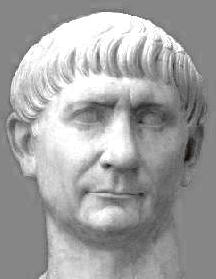 Trajan (98-117).
He was followed by Trajan, who proved to be a capable administrator as
well as a promoter of further military successes for Rome. He
built in Rome both a new forum and market and some important ceremonial
landmarks (Trajan's column). But it is in the area of military
and diplomatic policy that he is best remembered. Under his rule
the Empire reached its furthest extent. He marched into Armenia
and placed his own man on the Armenian throne. Then in 116 Trajan
continued his conquest into Parthia itself, seizing Babylon, Ctesiphon,
and Susa, deposing Osroes, and placing his own ruler on the Parthian
throne. But the venture overtaxed his energies – and he faced
rebellion in many places in the newly expanded Empire.
Mesopotamia was restless, and once again the Jews rose up in rebellion
against Rome. Very ill, he managed to return to Rome before he died
there in 117. The Romans knew that they had lost a great Emperor
– one of their very best. Trajan (98-117).
He was followed by Trajan, who proved to be a capable administrator as
well as a promoter of further military successes for Rome. He
built in Rome both a new forum and market and some important ceremonial
landmarks (Trajan's column). But it is in the area of military
and diplomatic policy that he is best remembered. Under his rule
the Empire reached its furthest extent. He marched into Armenia
and placed his own man on the Armenian throne. Then in 116 Trajan
continued his conquest into Parthia itself, seizing Babylon, Ctesiphon,
and Susa, deposing Osroes, and placing his own ruler on the Parthian
throne. But the venture overtaxed his energies – and he faced
rebellion in many places in the newly expanded Empire.
Mesopotamia was restless, and once again the Jews rose up in rebellion
against Rome. Very ill, he managed to return to Rome before he died
there in 117. The Romans knew that they had lost a great Emperor
– one of their very best.
5This was a term assigned by Roman historians, most of them of the Senatorial class, and thus politically biased in their appraisal of Rome's various
emperors.
The furthest reach of the Empire - 117 AD
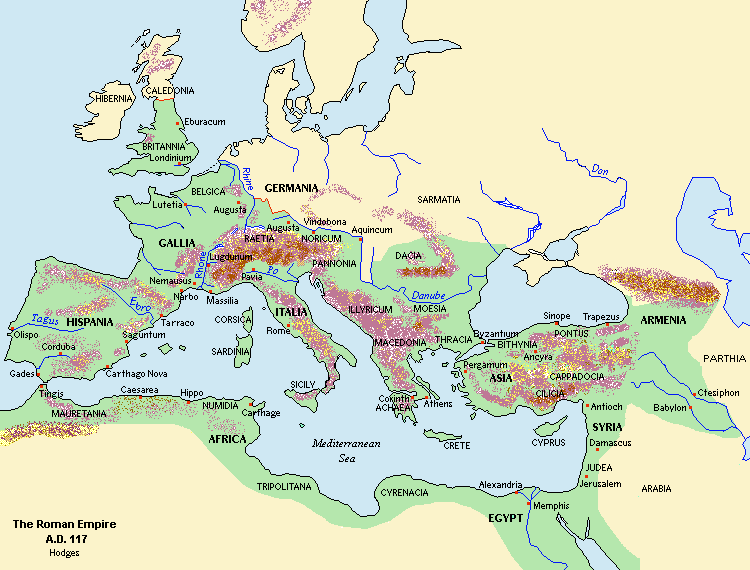
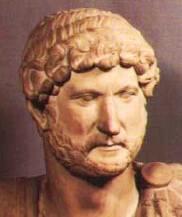
He saw himself as something of an intellectual as well. He
greatly admired Greek philosophy and literature (he even started the
fashion of wearing a beard, Greek-style) and considered himself a poet
and a Stoic and Epicurean philosopher.
The end of his rule was marked by a major crisis in Judea – where he
faced a massive and destructive revolt by the Jews, led by Bar
Kokhba. The problem began when Hadrian had Jerusalem rebuilt
(destroyed in the earlier 67-70 Jewish rebellion) – but as a Roman
city, Aelia Capitolina. He also erected a temple to Jupiter on
the foundations of the leveled Jewish Temple. And he decreed an
end to the "barbaric" Jewish practice of circumcision. This
proved to be too much to the Jews and in 132 they rose up again in
rebellion. The Jews proved to be very difficult to tame: Hadrian lost
possibly an entire legion to the Jews, and had to call in legions from
all around the Empire to finally bring the Jews to submission
(135). The loss of Jewish life and social position was
enormous. Furthermore, from that point on, a vindictive Hadrian
dedicated himself to rooting out Judaism from the Empire.
But his health at this point was failing … and he died in 138.
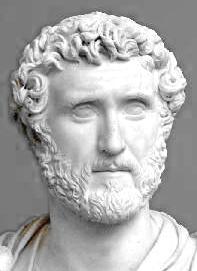 Antoninus Pius (138-161).
Antoninus was a devoted follower of Hadrian, even pressuring the Senate
to deify Hadrian – thus himself receiving the title "Pius" for his
devotion to Hadrian. Interestingly, Antoninus did not come to
prominence as a military man – nor did he ever develop any relationship
with any of the legions, as had those before and after him. His
rule was the most peaceful of any in the long run of the Empire –
though he had to deal with relatively small military disturbances from
time to time. He never left Italy to personally face
disturbances, but always worked through Rome's governors – drawing
praise from many for his relatively peaceful handling of Roman
politics. However, this seemed to have produced the impression of
Roman weakness in the estimation of many of Rome's enemies (such as the
ever-troublesome Parthians) – which his successors would have to deal
with. Antoninus Pius (138-161).
Antoninus was a devoted follower of Hadrian, even pressuring the Senate
to deify Hadrian – thus himself receiving the title "Pius" for his
devotion to Hadrian. Interestingly, Antoninus did not come to
prominence as a military man – nor did he ever develop any relationship
with any of the legions, as had those before and after him. His
rule was the most peaceful of any in the long run of the Empire –
though he had to deal with relatively small military disturbances from
time to time. He never left Italy to personally face
disturbances, but always worked through Rome's governors – drawing
praise from many for his relatively peaceful handling of Roman
politics. However, this seemed to have produced the impression of
Roman weakness in the estimation of many of Rome's enemies (such as the
ever-troublesome Parthians) – which his successors would have to deal
with.
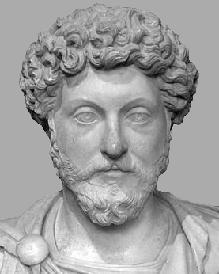 Marcus Aurelius (161-180).
However, the next "Good Emperor," Marcus Aurelius, was very much the
military man … as well as an excellent Stoic philosopher! Marcus Aurelius (161-180).
However, the next "Good Emperor," Marcus Aurelius, was very much the
military man … as well as an excellent Stoic philosopher!
But during his first years in power, he shared the position as emperor
with his adoptive brother, Lucius Verus, whom he raised to power in
order to help him run the huge Empire. Verus proved to be a huge
help in getting the Parthian threat reduced. But Verus would fall
ill and die in 169, leaving Marcus Aurelius to continue his rule alone.
Marcus Aurelius had the very best education of the time and
demonstrated a keen intellect very early in life. He had a
natural affinity for philosophy – which would reveal itself later when
he became Emperor.
Marcus Aurelius was very much the military man – called upon to deal
with not only the ongoing Parthian problem to the East … but to the
increasingly serious problem of the movement of Germanic tribes up to
Rome's northern borders – the Germanic tribes themselves pushed into
that position by other tribes behind them, trying to escape the
pressures of population growth, climate problems, and hunger.
As ruler of a mighty empire, there was something Solomon-like about
Marcus Aurelius. From 170 until his death in 180, he recorded his
thoughts (in Greek) on life, death, virtue, human purpose, etc. – that
had all the qualities of Solomon's philosophical reflections found in
Ecclesiastes in the Hebrew Bible … or even of Buddha's teachings about
the folly of human desire. His writings were later collected into
a single work, Meditations. It is a classic in Stoic thought.
In 178, he was forced to turn his attention back to the Germans along
the Danube. He again defeated the Germans soundly. But
Marcus's health was failing him and he died in 180 at Vindobona
(Vienna) along the German border.
|
|
Roman Britain
(basically a footnote!)
Early efforts at establishing Roman rule in Britain.
Julius Caesar invaded Celtic Britain twice, in 55 and 54 BC. No
direct Roman control came of his effort – though a military alliance
with one of the Celtic kings was established (the Celts had long been
trading with Rome anyway – thus there was already some sort of
Celtic-Roman relationship in the works even prior to Rome's political
intrusion). Though the Romans were at this point awake to the
possibility of Roman expansion into Britain, no serious efforts to
subdue Britain were made by the Romans until a century later.
Claudius begins the actual conquest - 43 AD.
Beginning in AD 43, under the Emperor Claudius, the Romans began the
process of subding Britain, a region at a time. By 47 Britain
south of the Humber River and east of Wales was under Roman
control. By 60 (Nero was ruling Rome by this time) the Roman
legions had destroyed the Druid religious or political center at Mona
(or Anglesey).
Boudica's revolt—61 AD.
But the following year, 61, a major Celtic uprising led by the Celtic
Queen Boudica threatened to reverse these Roman victories.
Emperor Nero was even considering abandoning Britain when Roman legions
under Suetonius defeated a huge Celtic army -possibly 10 times the size
of the Roman army – somewhere along the main Roman road (later – in the
Middle Ages – termed 'Watling Street") which ran from the English
Channel to Wales.
Expansion into Wales and Scotland.
Over the next 20 years the Romans extended their control into Wales and
north to the Pennine Mountains – and under the General Agricola (whose
action in Britain earned enough acclaim to eventually make him Emperor)
even reached well into Scotland – though upon his return to Rome the
legions in Britain under less capable generals would be forced to pull
way back from Agricola's forward line of advance.
Holding the line against Scotland: Hadrian's Wall.
Eventually an 80-mile wall would be built across northern Britain under
orders in 122 of the Emperor Hadrian, to keep the troublesome Picts of
Scotland out of Britain. Several more attempts were made by Roman
legions to extend their control north of that line, importantly
including the effort by the Emperor Septimus Severus in the early 200s
to extend Roman rule even to northern Scotland - who slaughtered
countless Scottish Celts but also lost 50,000 of his own men – before
abandoning the effort and falling back to the line of Hadrian's wall. |
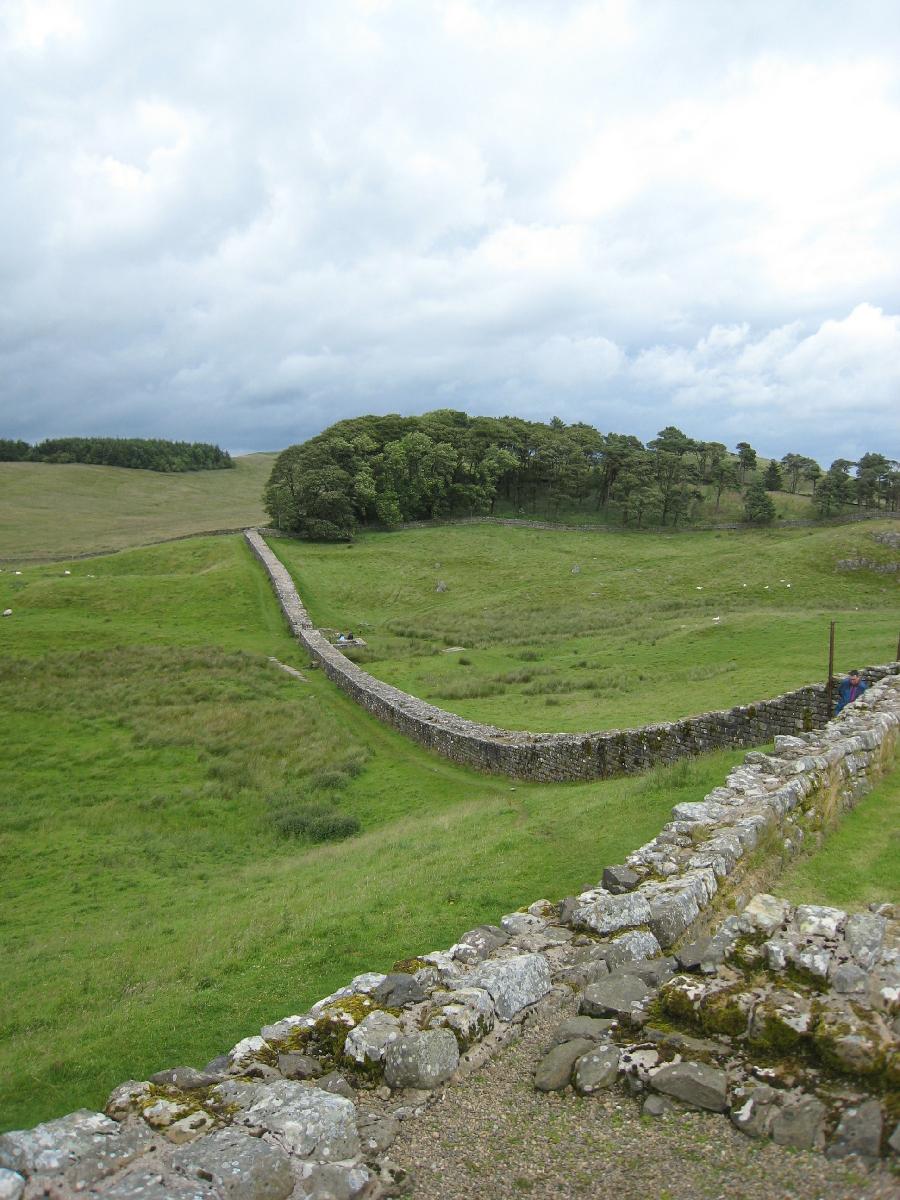
A
stretch of Hadrian's Wall
viewed from Vercovicium
near Housesteads in
Northumberland
THE
INTELLECTUAL CULTURE OF THE ROMAN EMPIRE |
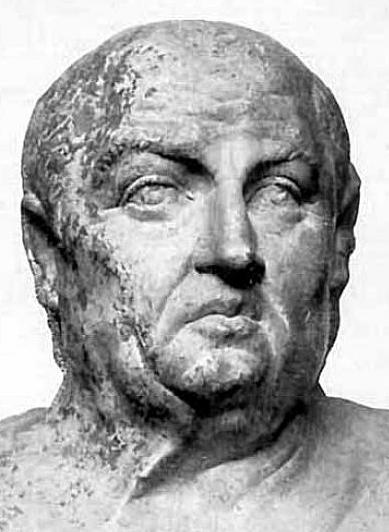 Lucius Annaeus Seneca (the Younger) (4 BC-65 AD).
Seneca was a Spanish-born Stoic philosopher/statesman who stressed –
and practiced – a gentle virtue in his living. He was of a
distinct intellectual background, his father (Seneca the Elder) having
been a notable rhetorician (polished public advocate before the law)
and author in his time. The younger Seneca was educated in Rome
under the Stoic Attalus, studying rhetoric and philosophy in
preparation to become an advocate (lawyer) like his father. Lucius Annaeus Seneca (the Younger) (4 BC-65 AD).
Seneca was a Spanish-born Stoic philosopher/statesman who stressed –
and practiced – a gentle virtue in his living. He was of a
distinct intellectual background, his father (Seneca the Elder) having
been a notable rhetorician (polished public advocate before the law)
and author in his time. The younger Seneca was educated in Rome
under the Stoic Attalus, studying rhetoric and philosophy in
preparation to become an advocate (lawyer) like his father.
As Seneca grew in stature and respect at Rome, he also drew suspicious
political scrutiny from the imperial party. And in 41 AD he was
banished to Corsica by the emperor Claudius. Eight years later he
was brought out of exile to become the tutor of the young Nero – who
for a while was brought up under the positive influence of Seneca.
In 57 AD Nero (now emperor) appointed Seneca Roman consul. From
this important position Seneca hoped (for a few years) to augment a
regime of enlightenment in Roman political life. But imperial
pride once again worked against the virtuous (and increasingly popular)
Seneca. Nero, now emperor and coming under the influence of an
ambitious and flattering court circle – and presuming himself to be a
great luminary of his age and thus resenting the greater light cast by
Seneca – began to undermine his old tutor's position. Sensing the
danger, Seneca quietly retired from public life.
But in 65 AD the elderly Seneca was accused (along with his
rhetorician-statesman nephew Lucanus) of being part of the failed plot
(led by Gaius Calpurnius Piso) to assassinate Nero. Nero thus
ordered Seneca to take his own life.
With Stoic reserve and resolve Seneca did as ordered – ending his life
in keeping with his Stoic understanding of life: not to place too
much thought on one's physical existence but instead to find such inner
peace that neither life nor death distract someone from his deeper
sense of inner being.
Political historians
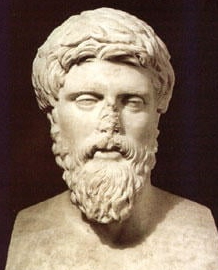 Plutarch (ca. 45 to 125 AD). Plutarch was a Greek historian and biographer of a large number of famous Greek and Roman individuals (Lives of the Noble Greeks and Romans
– also known as Parallel Lives – being his best-known work) – and the
source of much of our in-depth knowledge of many historical
figures. He came from a noble Greek family, was well educated,
and became a Roman citizen … soon finding himself moving in a circle of
prominent Romans. He ultimately served as a magistrate of his
hometown of Chaeronea – and a representative of his town on various
missions abroad. Thus it was that he wrote his biographies on the
foundation of his own personal knowledge of Greek and Roman politics
from a very practical standpoint. It was even claimed that in
Plutarch's later life Hadrian made him procurator of Achaea. But
interesting also was that in the mid-90s, Plutarch also became a priest
at the Temple of Apollo at Delphi … thus a mystic – as well as a
political secularist! Plutarch (ca. 45 to 125 AD). Plutarch was a Greek historian and biographer of a large number of famous Greek and Roman individuals (Lives of the Noble Greeks and Romans
– also known as Parallel Lives – being his best-known work) – and the
source of much of our in-depth knowledge of many historical
figures. He came from a noble Greek family, was well educated,
and became a Roman citizen … soon finding himself moving in a circle of
prominent Romans. He ultimately served as a magistrate of his
hometown of Chaeronea – and a representative of his town on various
missions abroad. Thus it was that he wrote his biographies on the
foundation of his own personal knowledge of Greek and Roman politics
from a very practical standpoint. It was even claimed that in
Plutarch's later life Hadrian made him procurator of Achaea. But
interesting also was that in the mid-90s, Plutarch also became a priest
at the Temple of Apollo at Delphi … thus a mystic – as well as a
political secularist!
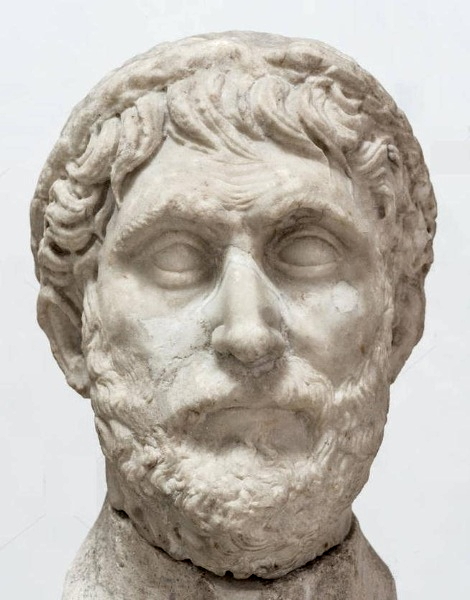
In
order to get his theory to work, he (and others after him) had to add a
large number of secondary explanations (following Hipparchus' use of
eccentrics and epicycles) of the peculiar movement of heavenly bodies
around the earth in order to get them to fit his theory.
His theory was widely adopted by Western thinkers – down until the
approach of modern times when it became dislodged – with much
resistance, not least of all from the Christian church.
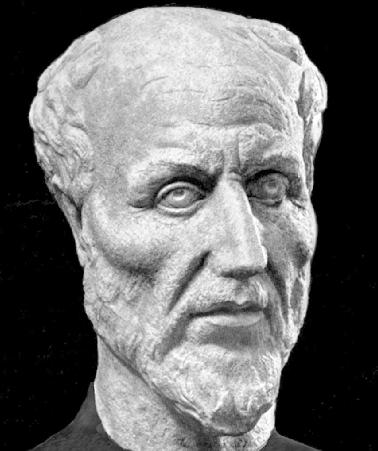 Plotinus (205 to 270 AD). Plotinus was a developer of "Neo-Platonism." He headed Plato's Academy in Athens and there wrote the wrote The Six Enneads (250). Plotinus (205 to 270 AD). Plotinus was a developer of "Neo-Platonism." He headed Plato's Academy in Athens and there wrote the wrote The Six Enneads (250).
Like Plato, Plotinus accepted that our material world was a mere shadow of the World Soul (Psychè Kósmou)
from which human souls derive their power), which in turn was a shadow
of an even higher world, that of the Nous (where the Ideon are located)
… which was itself a shadow of the unknowable One (’έν – Hen)
or God. In other words, the world has four levels of reality: the
"Divine Triad" of God as the highest level, and then the derivative
world of the divine Nous (or Mind), then the level of the World Soul
(the bridge between the material world and the Divine Nous ... which
actually activates the material world). Then derivative of all
that is finally the visible or "sensible" material world (with its
tragic potential for evil).
According to Plotinus, the wise man would try, by means of very
rigorous self-discipline, to free his soul from the material world or
"matter" … and seek contemplative unity as high up as possible within
the Divine Triad … even possibly attaining a degree of unity with the
One. Very much like an Eastern mystic, Plotinus claimed to have
achieved this unity several times.
His pupil Porphyry organized the treatises of Plotinus (the Enneads)
and also wrote a biography of his master.
The Neoplatonic philosophy was subsequently adopted by the fathers of
the church, Ambrose (c. 339-397) and Augustine (354-430), and was to
remain the philosophical school par excellence … until Aristotle was
rediscovered in the twelfth century.
Diogenes Laertius (200s AD). Likewise, through his important 10-volume work, Lives and Opinions of Eminent Philosophers,
we possess a vastly richer knowledge about many of the ancient Greek
philosophers … although we know very little about Laërtius himself.
6Actually an Arab rendering of the title of this work The Great Treatise ('H Μεγάλη Σύνταξις – Hē Megalē Syntaxis)
… because Ptolemy was highly regarded in the Muslim world … and it was
by way of an Arab translation that Ptolemy was reintroduced to the
Western world in the 1100s.
THE DECLINE OF THE ROMAN EMPIRE |
Following
the rather grand period of the "Five Great Emperors," Rome then headed
into a decline … one that Rome did not really know how to break free
from. It was all very tragic.
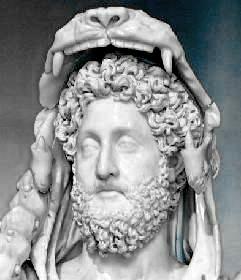 Commodus (180-192).
Commodus, Marcus Aurelius' son, brings the period of the "Five Good
Emperors" to an end. His rule marks the transition to very
troubled times for the Roman Empire. Although his rule began
well, a conspiracy in 182 (promoted primarily by members of his own
family) to assassinate him turned him paranoid. And from paranoia
he slipped into insanity. He loved to project himself as
Hercules, a god of great physical strength. He renamed Rome after
himself, termed all Romans as "Commodians," redrafted the months of the
calendar in using his own twelve names for the months of the
year. He did this less out of guile than out of a case of
increasing simple-mindedness. But it was his behavior in the
public arena that finally braced the Senate sufficiently to organize
his death (he would entertain Roman crowds with his slaughter of
hundreds of animals and hundreds of disabled Romans – and hold hundreds
of bloodless gladiatorial combats, which he always "won," of
course). Finally in 192 he was strangled in his bath by a
wrestler that the Senate had paid to do the job. Commodus (180-192).
Commodus, Marcus Aurelius' son, brings the period of the "Five Good
Emperors" to an end. His rule marks the transition to very
troubled times for the Roman Empire. Although his rule began
well, a conspiracy in 182 (promoted primarily by members of his own
family) to assassinate him turned him paranoid. And from paranoia
he slipped into insanity. He loved to project himself as
Hercules, a god of great physical strength. He renamed Rome after
himself, termed all Romans as "Commodians," redrafted the months of the
calendar in using his own twelve names for the months of the
year. He did this less out of guile than out of a case of
increasing simple-mindedness. But it was his behavior in the
public arena that finally braced the Senate sufficiently to organize
his death (he would entertain Roman crowds with his slaughter of
hundreds of animals and hundreds of disabled Romans – and hold hundreds
of bloodless gladiatorial combats, which he always "won," of
course). Finally in 192 he was strangled in his bath by a
wrestler that the Senate had paid to do the job.
Needless to say, Commodus had made no arrangements for a smooth
succession upon his death. Roman politics fell into further
chaos. Over the next year there were five different generals who
laid claim to the title of Emperor. Assassinations and bribes
followed in rapid succession as claimants attempted to line up soldiers
and Senators behind their claim to the throne.
The Severan Dynasty (193-235)
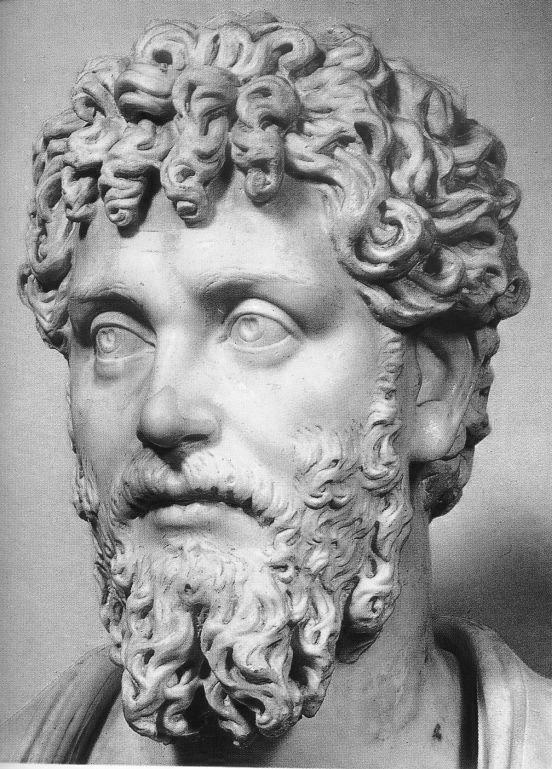 Septimius Severus (193-211).
The Roman general Septimus Severus fought his way to power by having
his army defeat the armies of other Roman generals contending for the
position as Roman emperor. He then took on the Parthians, sacked
the Parthian capital Ctesiphon and retook Mesopotamia for Rome.
He was naturally suspicious of the Praetorian Guard … and replaced
individuals with his own supporters to cover for him while he was away
fighting Rome's enemies. However he let his cousin Plautianus
take on too much authority in the Guard – and had him put to death
(205). Septimius Severus (193-211).
The Roman general Septimus Severus fought his way to power by having
his army defeat the armies of other Roman generals contending for the
position as Roman emperor. He then took on the Parthians, sacked
the Parthian capital Ctesiphon and retook Mesopotamia for Rome.
He was naturally suspicious of the Praetorian Guard … and replaced
individuals with his own supporters to cover for him while he was away
fighting Rome's enemies. However he let his cousin Plautianus
take on too much authority in the Guard – and had him put to death
(205).
Severus ended his days personally directing military operations against
Rome's tribal enemies who were constantly threatening Rome's
borderlands. In 208 he traveled to Britain in order to extend
Roman rule even to northern Scotland. In the process his troops
slaughtered countless Scottish Celts …. but he also lost 50,000 of his
own men. In late 210 he became ill while still in Britain …
and died early the following year.
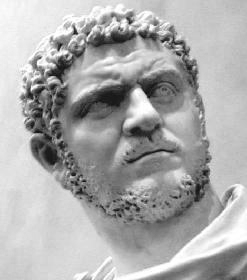 Caracalla (211-217).
Severus's sons Caracalla and Geta succeeded him, though Caracalla
immediately murdered his brother. Then when a satire about his
murder of his brother was produced in Alexandria, Caracalla took
revenge by sending troops to Alexandria to loot and slaughter (over
20,000 Alexandrians killed) … earning Caracalla the reputation as one
of Rome's cruelest emperors. Caracalla (211-217).
Severus's sons Caracalla and Geta succeeded him, though Caracalla
immediately murdered his brother. Then when a satire about his
murder of his brother was produced in Alexandria, Caracalla took
revenge by sending troops to Alexandria to loot and slaughter (over
20,000 Alexandrians killed) … earning Caracalla the reputation as one
of Rome's cruelest emperors.
He treated his army lavishly – understanding the importance of keeping
happy this institution which he both admired and feared deeply.
He also created the last of the great architectural wonders of Rome: a
giant bath that could accommodate over 2,000 at a time (named,
appropriately, the Baths of Caracalla). He was busy during much
of his reign defending Rome's borders against the Germanic Alamanni at
the Rhine frontier. He was, in fact, on his way to renew the war
with Parthia in 217 when he was assassinated by a member of the
Praetorian Guard.
Macrinus (217-218) and Elagabalus (218-222).
The two emperors that followed Caracalla were put in place by the
Praetorian Guard (Macrinus was actually its Prefect) and also brought
down by the same organization. Elagabalus turned out to be a
disappointment (but only 14 when put in his position as emperor)
because of his crude sexual adventures … which led to his assassination.
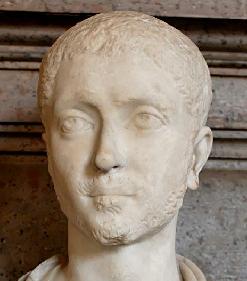 Alexander Severus (222-235).
Elagabalus's cousin Alexander too was only 14 when he ascended the
throne. In fact it was his mother, Julia Mamaea, who was the real
power behind the throne. In general, his reign was a stable one
for Rome. He did what he could to put Rome back on something of a
moral-legal basis, he attempted to place Rome's governmental structures
on a more rational footing, and he strengthened the economy by cutting
back on governmental extravagance, lowering taxes, improving the
quality of Roman coinage, placing controls on interest rates, etc. Alexander Severus (222-235).
Elagabalus's cousin Alexander too was only 14 when he ascended the
throne. In fact it was his mother, Julia Mamaea, who was the real
power behind the throne. In general, his reign was a stable one
for Rome. He did what he could to put Rome back on something of a
moral-legal basis, he attempted to place Rome's governmental structures
on a more rational footing, and he strengthened the economy by cutting
back on governmental extravagance, lowering taxes, improving the
quality of Roman coinage, placing controls on interest rates, etc.
His problems on the Roman frontier would however make his rule deeply
troubled. A new Parthian dynasty, the Sassanids, had extended
Persian control deep into Roman territory in the eastern reaches of the
Roman empire. When Alexander marched his army out to meet the
Sassanids in 232, the results were something of a standoff for both
sides.
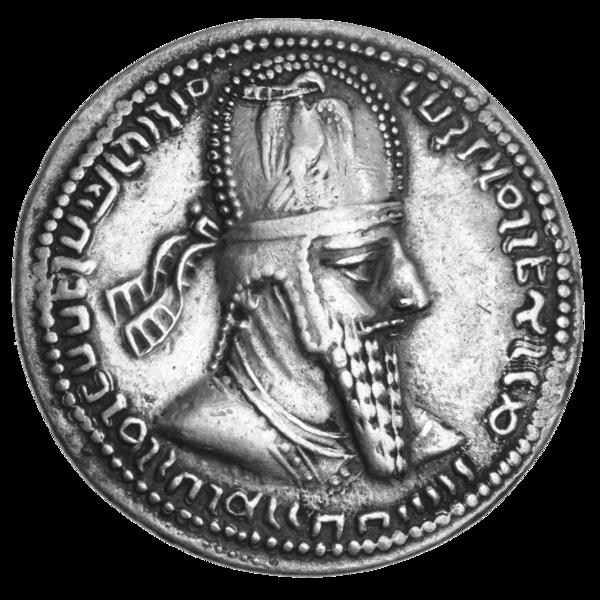 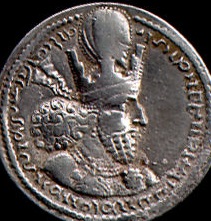
Sassanid kings Ardashir (224-240) and Shapur (240-270)
Two
years later Alexander led his armies out to expel the German armies
that had crossed the Rhine and had overrun eastern Gaul. He
crossed into Germany – and then offered to pay tribute to the Germans
rather than fight them to resolve the issue. The soldiers were
incensed – and plotted his removal and replacement by a soldier popular
among the troops. In 235 Alexander and his mother were both
murdered in a mutiny of his troops.
Fifty years of imperial turmoil (235-285)
The rapid turnover of Emperors.
The assassination of Alexander marked the beginning of a long period of
political, economic and social chaos in which emperors rose and fell in
rapid succession – frequently because they were murdered by the
Praetorian Guard as these "emperor-makers" shifted their loyalties from
one imperial candidate to another (as many as 25 emperors during this
period, depending on how one counts the numerous pretenders to
power). Unfortunately for Rome, generals were more interested in
fighting each other for the title of emperor than in offering battle to
the many tribal peoples who began to cross the Rhine and Danube in
raids into Roman territory. Meanwhile the Sassanids, taking
advantage of this chaos within the higher reaches of Roman power,
extended Persian control into Mesopotamia.
Military decline.
At the same time, the military needs and military expense of the Roman
Empire quickly became almost limitless. After a while there were
no more rich neighbors for Rome to plunder (they left the Germans alone
on the opposite side of their borders because the primitive Germans had
nothing to offer Rome economically). Thus the Empire had to rely
on the resources of its own people to pay for its ongoing and
extravagant military ventures. Mercenaries hired from Rome's
former (or even continuing) enemies replaced the patriotic free
citizen-soldier of Rome, the latter, impoverished from too great a
demand for his increasingly lengthy term of military service,
inevitably falling into terrible poverty. Soon the city's slums
were filled with the once free citizen-soldier and his family.
And so it was that the Empire lost touch with what it once was.
Economic decline.
Direct barter in goods and services (a terribly cumbersome way to do
business) became the accepted means of economic exchange as Roman
coinage became increasingly debased by emperors, who used cheap metals
to pay their soldiers the tribute or financial reward that the soldiers
expected when they threw their support behind a new imperial
candidate. With the military no longer doing its job in
protecting the empire, roads became unsafe – and thus shipping and
trading declined dramatically. Thus also Roman farms ceased being
commercial enterprises – and instead became local enterprises (manorial
estates) producing only for their own immediate needs. Towns were
forced to erect walls and look to themselves for their own
protection. And as farms and towns developed this local,
self-sufficient status, they were less inclined to give significant tax
support to a Roman authority that was increasingly removed from the
world that concerned them.
Distress in the countryside.
Life for the Roman commoners became so difficult during this period
that they were forced to escape the cities for the countryside in order
to find enough to feed themselves and their families – offering owners
of these countryside estates in exchange for their personal survival a
rather permanent servant status, a status that was transferred to their
descendants as well (the beginning of serfdom). Also many small
farmers were just as unable to provide for themselves and thus too fell
into legal bondage to the more successful large-scale farmers in order
to survive.
Buying popular support of the Empire.
The Roman government itself attempted to buy the support of the people
for this decaying system through what was termed by the ancient Roman
poet Juvenal: “bread and circuses” (or bread and games). In a
piece of sharp satire about the state or condition of Rome, Juvenal
commented that the Romans no longer had any interest in defending the
integrity of Rome itself. They had abandoned the older
generations of Romans' noble interest in their public duties, in their
civil and military service to Rome. Instead the people now
anxiously set their hope on just two things: bread and circuses (wheat
distributions and chariot races, gladiatorial contests and an
occasional feeding of Christians to the lions) ... very expensive
entitlements (and huge drain on the public treasury) that the Roman
authorities had accorded the people in order to keep them subdued.
For a vast empire, undergoing obvious moral decay after about 200 AD,
such crass payoffs were not enough. Rome and the Romans were
suffering from a deep moral emptiness that could not be filled with
bread and circuses.
Moral confusion.
Rome was relatively tolerant of the social and cultural 'pluralism'
within its borders – as long as everyone showed due respect to Roman
authorities and their gods. When the Roman emperors themselves
posed as gods this all became quite curious. But for the most
part everyone was willing to play along with the Roman thing.
Morally and ethically, Rome didn't reach deeply into the private hearts
of its subjects. That belonged to their local gods and religious
traditions.
Given
Rome's obvious lack of moral-spiritual focus at this point, a number of
exotic (foreign) religions began to enter vigorously the Empire from
the East – with loftier ideals than the old Roman pantheon of humanlike
gods and goddesses. Mithraism from Persia, with its severe
good/evil dualism, offered its services for a while as the moral
underpinning of an Empire seeing evil swallow up good everywhere.
It was especially very popular within the Roman legions, where life was
either do or die. Also mystery cults from Syria, Babylon and
Egypt were becoming quite popular – though they had no well-organized
advocacy group. Then too the practitioners of Judaism were
numerous in the Empire … and Judaism was opening up its ranks to
newcomers – though it never really developed a full zeal for bringing
the whole of Rome into its ranks.
The heroic Christian witness.
Christianity had no such hesitations, being quite evangelical. At first
it appealed mostly to the poor and helpless who had flocked to the
Roman cities in the desperate hope of finding some remedy to their
plight. In Christianity these Romans found not only comfort, but
an incredible degree of heroic dignity – especially in the face of the
numerous rounds of persecutions that the emperors inflicted on the
members of this strange (very un-Roman) Eastern sect when its members
refused to acknowledge the emperors as gods.
But this persecution seemed only to present Christianity in an ever
more heroic or glorious light to the other Romans watching this
murderous persecution. The bravery of the Christians in the face
of certain death began to move sympathetically the crowds that gathered
to watch these horrifying events. Eventually Christianity's
obvious moral and spiritual strengths were beginning to attract the
interest of even nobler Romans ... which drew even greater wrath from
emperors who saw the old Roman pagan order now coming under serious
challenge from Christianity.
Political fragmentation.
This loss of Roman civic spirit was so pronounced that at one point
(258-274) the Roman empire broke into three separate empires: the
Gallic Empire in the West (Britain, Gaul and Spain), the Palmyrene
Empire in the East (Egypt, Palestine, Syria) – with what was left as
"the Roman Empire" somewhere in between.
Attempts at reform
There were however some notable emperors during this period, who attempted to bring Rome back to order.
Decius (249-251),
though his reign was short, left a major mark on Rome in his efforts to
purge Rome of all but its original state religion (the Christians
suffering greatly as a result) and in his efforts to expel the recently
arrived Goths (which resulted unfortunately in his army's destruction
and his own death in battle).
Valerian (253-260),
though he ruled longer, faced one disaster after another: the Goths who
were pillaging Asia Minor, a plague which broke out within his troops,
and finally his defeat and (presumably) execution by the Sassanids in
his struggle to drive them from Rome's eastern provinces.
Also his reign marked another period of intense persecution of
Christians – many of whom were well-placed socially and politically.
Aurelian (270-275)
was able in 274 to defeat the Empress Zenobia and restore to Rome the
territory she had ruled as the Palmyrene Empire – and in the same year
to bring the Gallic Empire back under Roman authority. But he too
was assassinated by the Praetorian Guard.
Aurelian
|
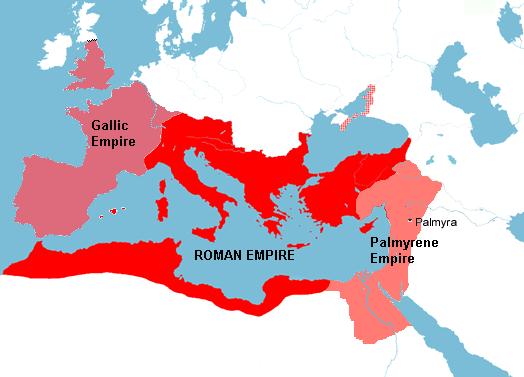
The Empire divided (258-274)
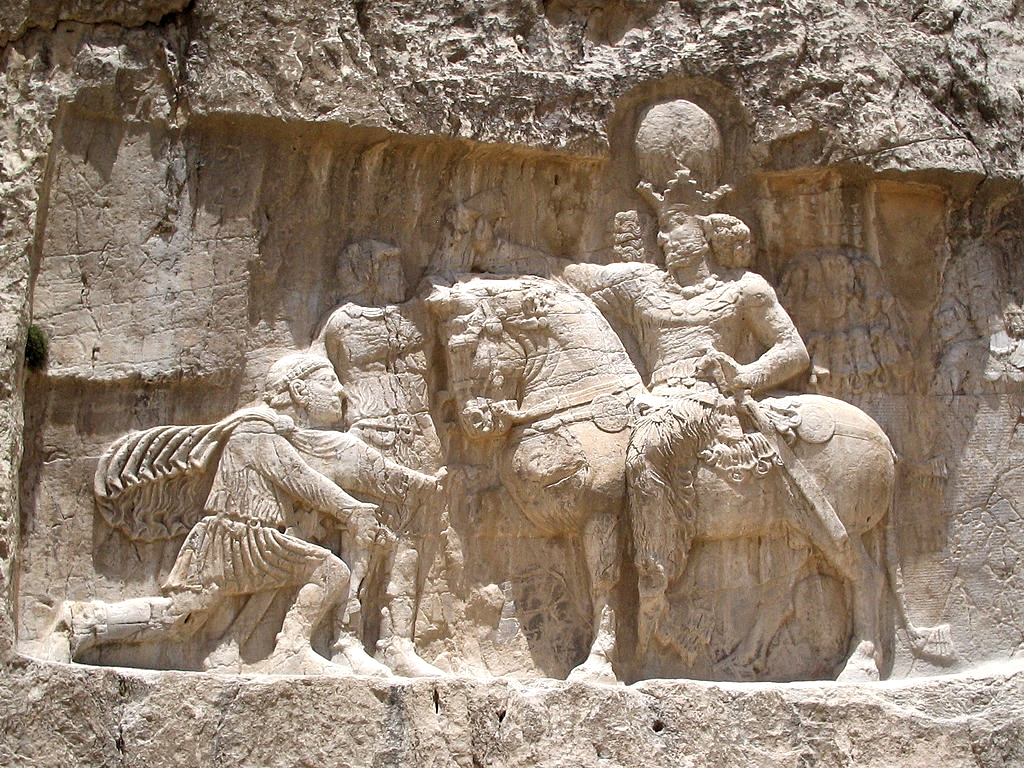 Valerian bows to his conqueror, Shapur - 260
Valerian bows to his conqueror, Shapur - 260
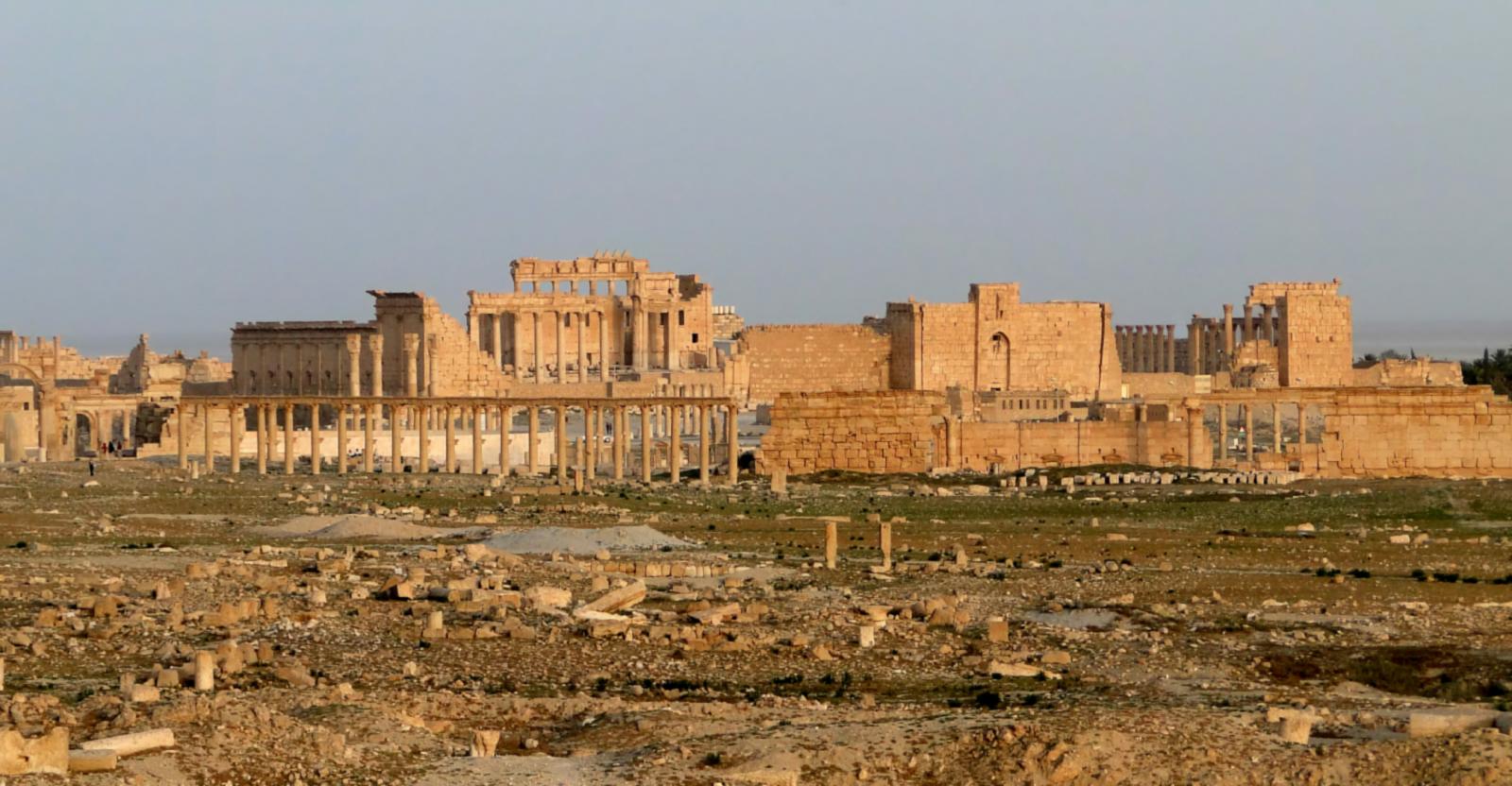
Temple of Bel complex in
the background and the Agora on left center in Palmyra, Syria
In 2017 this was mostly destroyed by Muslim fanatics belonging to the Islamic State
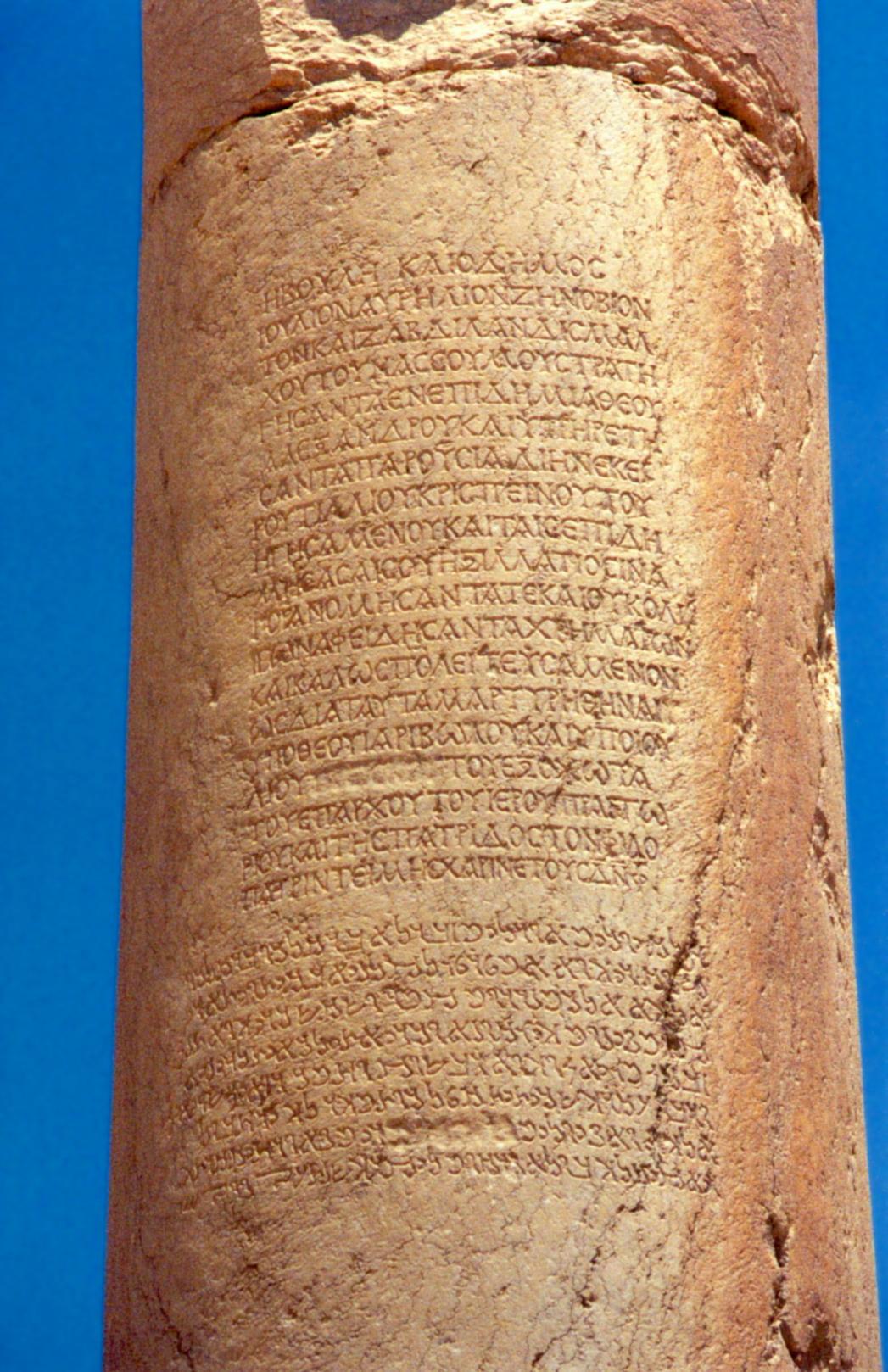
Inscription in Greek and
Aramaic in honour of Julius Aurelius Zenobius,
the father of Queen Zenobia,
at Palmyra
DIOCLETIAN
AND THE TETRARCHY (285-305) |
We
conclude our survey of imperial Rome with Diocletian, a reformer who
attempted to bring this sorry period of Rome to an end. But the
irony is that in his dedicated efforts to restore Rome to some kind of
original purity he succeeded very unintendedly in closing out the age
of Classical Rome and setting up instead Rome's transition into
Christendom (our next section).
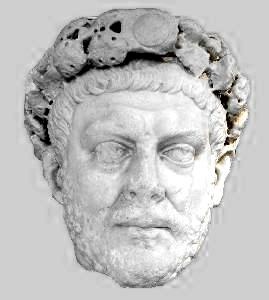 The division of the Empire into eastern and western halves and the "Tetrarchy" ("rule of four").
Diocletian was another non-Senatorial figure (born of Dalmatian
commoners) who simply worked his way up the ranks of the Roman legions
to his position of dominance. Aware of the difficulty of one man
giving effective governance to the whole of the Empire, soon after his
acclaim as emperor by Rome's troops in 285 Diocletian recognized fellow
soldier Maximian as co-emperor, with he himself serving as emperor or
"Augustus" over the eastern half of the Empire and Maximian serving as
Augustus over the western half. Then in 293 Galerius and
Constantius Chlorus were called into service as "Caesars" or assistants
(and successors) to the co-emperors, Galerius serving under Diocletian
and Constantius Chlorus serving under Maximian. The division of the Empire into eastern and western halves and the "Tetrarchy" ("rule of four").
Diocletian was another non-Senatorial figure (born of Dalmatian
commoners) who simply worked his way up the ranks of the Roman legions
to his position of dominance. Aware of the difficulty of one man
giving effective governance to the whole of the Empire, soon after his
acclaim as emperor by Rome's troops in 285 Diocletian recognized fellow
soldier Maximian as co-emperor, with he himself serving as emperor or
"Augustus" over the eastern half of the Empire and Maximian serving as
Augustus over the western half. Then in 293 Galerius and
Constantius Chlorus were called into service as "Caesars" or assistants
(and successors) to the co-emperors, Galerius serving under Diocletian
and Constantius Chlorus serving under Maximian.
The
Empire at that point had four rulers, each given different portions of
the Empire to rule. Unfortunately, when it came to fill vacant
positions, this formula proved to be as confusing as Roman politics
ever had been.
The old city of Rome's loss of status.
Not surprisingly, during Diocletian's tenure as Augustus or emperor,
the city of Rome itself (and the Senate) suffered politically … and
socially. Diocletian tended to avoid Rome, preferring to use
Milan or Ravenna as a base of operations when in Italy.
Furthermore, Diocletian's taking for himself the assignment of the
eastern half of the Empire was a clear sign that the political center
of the Empire was also shifting eastward from Italy to the Eastern
Mediterranean.
Religious persecution.
Foreign-born himself, Diocletian compensated by being "super-Roman" …
detesting any foreign intrusions, whether military or cultural, into
Roman life. He also hoped that religious uniformity within the
Empire might further buttress its political unity. Thus both
Diocletian and his assistant or Caesar Galerius took increasingly
hostile attitudes toward a number of popular eastern religions which
were spreading rapidly in the Empire. This became particularly
the case when the traditional temple priests claimed that they were
losing their powers due to the growing influence of these alien
religions, at first most notably Manichaeism.
This was a religion originated by the prophet Mani in the second half
of the 200s, who claimed to be a prophetic successor to Jesus … and the
prophets before him. Manichaeism blended gnostic Christianity
with elements of Persian or Zoroastrian light-dark, good-evil dualism.7
Diocletian detested Manichaeism intensely because of its Sassanid or
Persian connections – because Persia was Rome's main enemy at the time.
Consequently, he began persecutions of the Manichaean faith in the
Eastern Roman Empire in 302, seizing Manichaean property and executing
or enslaving the members of this religion.
Intense Christian persecution.
But he then turned on the Christians. His persecutions would turn
out to be the worst by far that the Christians were ever to experience.
In early 303 he ordered the destruction of all churches and the end to
Christian worship anywhere in the Empire. At the initiative of
his assistant Galerius, Christians were ordered to be dismissed from
the Roman legions. The similar principle was applied to the Roman
bureaucracy. And Christian freedmen (former slaves) were reduced
back into slavery.
This was followed by ever harsher measures: execution by sword or fiery
stake – left mostly to the discretion of local officials, some who were
rigorous in their attempt to eradicate the faith by whatever means
necessary … others less rigorous. For instance, Maximian's
assistant or Caesar Constantius ignored Diocletian's orders in his
western territory of Britain and Gaul.
In 304 Diocletian issued another edict which commanded all Christians
to be brought to a public place and offered the option of sacrificing
to the Roman gods – or facing execution.
This was a very serious problem for Rome itself because at this point
approximately one in every ten Romans was some kind of a Christian.
Pacifying the Empire.
Meanwhile tribal hostilities in the North, rebellion in the East
(Egypt) and a renewed war with Sassanid Persia kept the four rulers
very busy. With respect to the tribal hostilities, Diocletian was
able to strengthen Roman fortifications along the Danube River –
bringing both peace along that front, but also a heavy increase in the
tax burden on Rome. With respect to rebellion in Egypt,
Diocletian was successful in 298 not only in restoring control there
but also in placing a tighter Roman grip over the region. With respect
to the Sassanids, Diocletian was successful in 299 in forcing Persian
recognition of the restoration to Rome of most of Mesopotamia and
Armenia.
Problems of succession.
Then, probably much to everyone's surprise, in 305 both Diocletian and
Maximian stepped down from power, allowing their assistants, Galerius
and Constantius to step up from their positions as Caesars to the full
positions as Augustuses or Emperors. But this now merely opened
the question as to who now was to take the positions as supporting
Caesars. The rivalry became intense.
Thus with so many would-be Caesars contesting each other, in 308
Augustus Galerius and the retired Diocletian and Maximian called a
conference to try to work out a settlement so as to bring things back
to balance. But the effort merely produced even more imperial
claimants (seven) when new appointments were challenged by those left
out of the deal. Thus military chaos would continue to reign over the
Empire.
The Christian persecutions continue.
Meanwhile, the persecutions continued under Galerius, and supporting
Caesar, Maximinus (actually his nephew) – the latter being particularly
a strong enforcer of Christian persecution. Such persecution
continued until 311 when Galerius, now on his deathbed, issued a decree
officially ending the persecutions. However Maximinus –
self-elevated to full status as Eastern Augustus in 310 – soon ignored
the decree and continued the persecutions in his eastern realm … at
least until shortly before his own death in 313.
Constantine versus Maxentius.
At the same time, with the death of Galerius, former (uneasy) allies
Constantine and Maxentius now found themselves facing each other in the
matter of assuming supreme imperial powers in the West as its Augustus
… a position already held by Licinius (resulting from the 308
agreement).
How this conflict would play out would have tremendous implications for
the way Western civilization would develop from this point forward.
7The
Manichaeans professed the old Persian idea of a dualistic divinity: 1)
the creator/god of this physical world is Evil; 2) the god of Good is
master over the spiritual world. The two are in struggle with
each other for supremacy over life.
IMPERIAL
ROME — IN PICTURES |
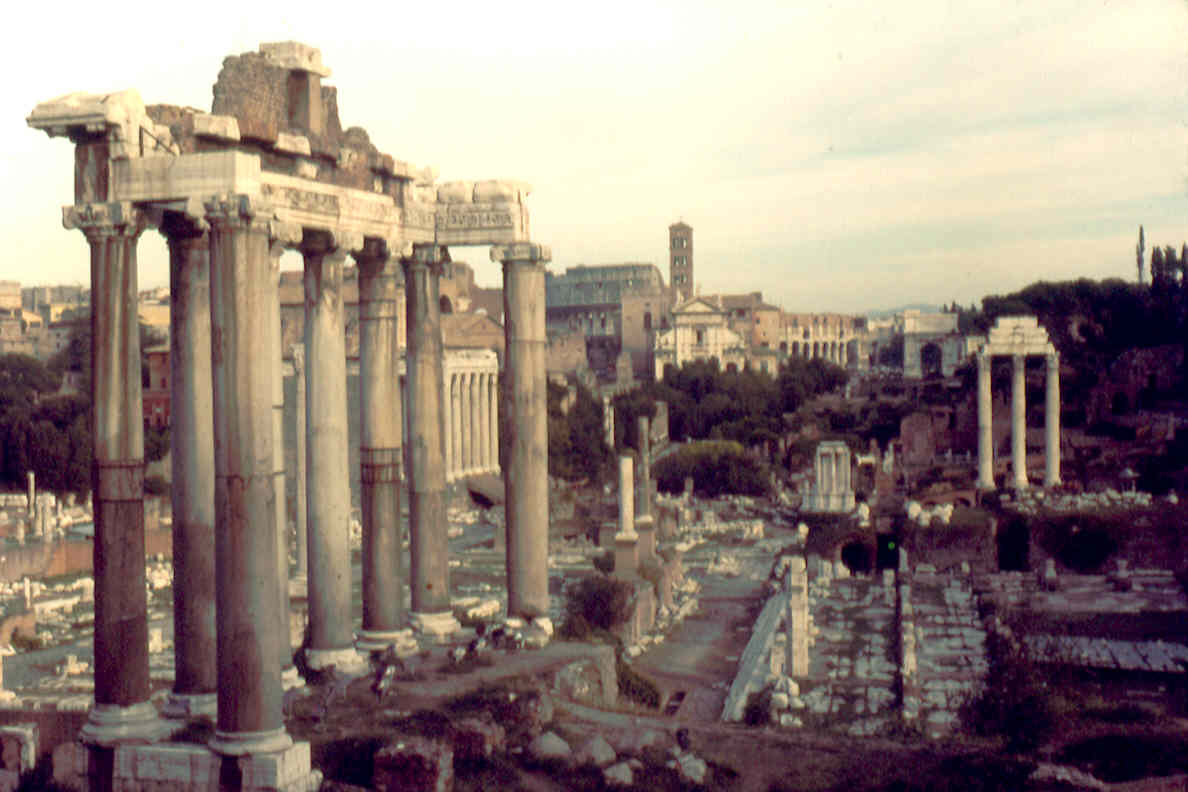
The Roman
Forum
Miles Hodges
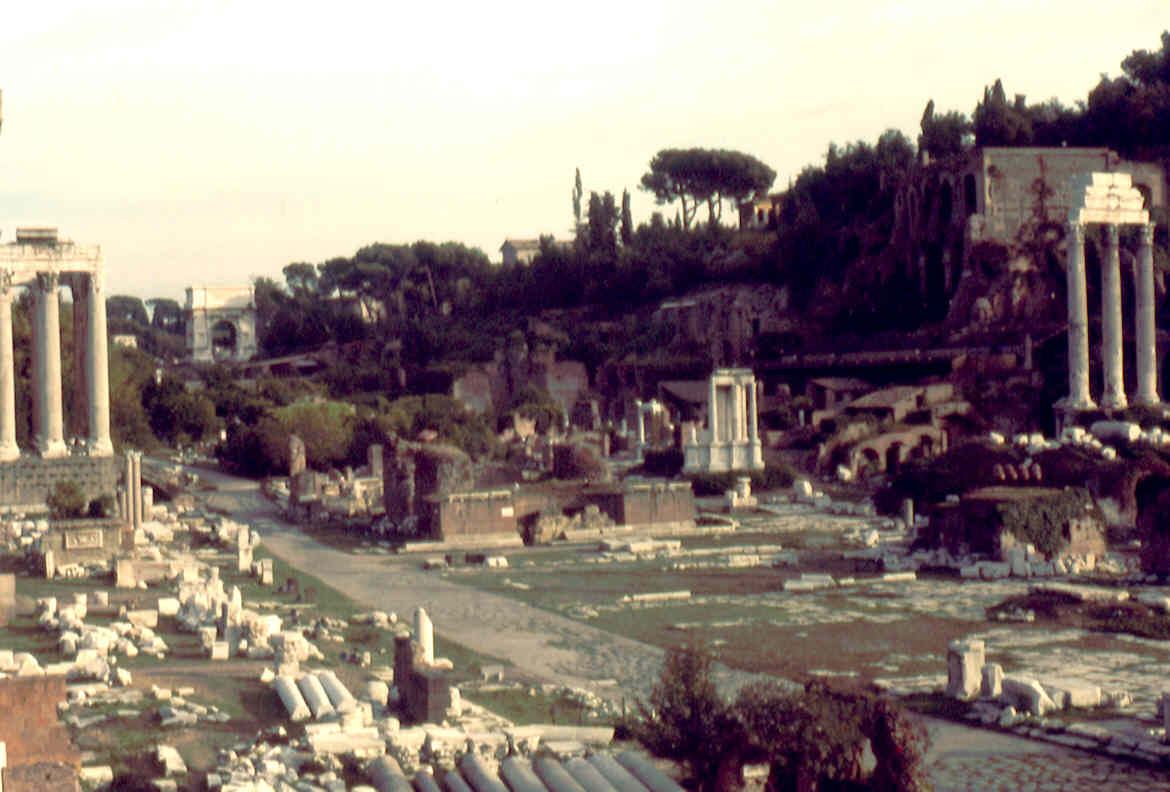
The Roman
Forum
Miles Hodges
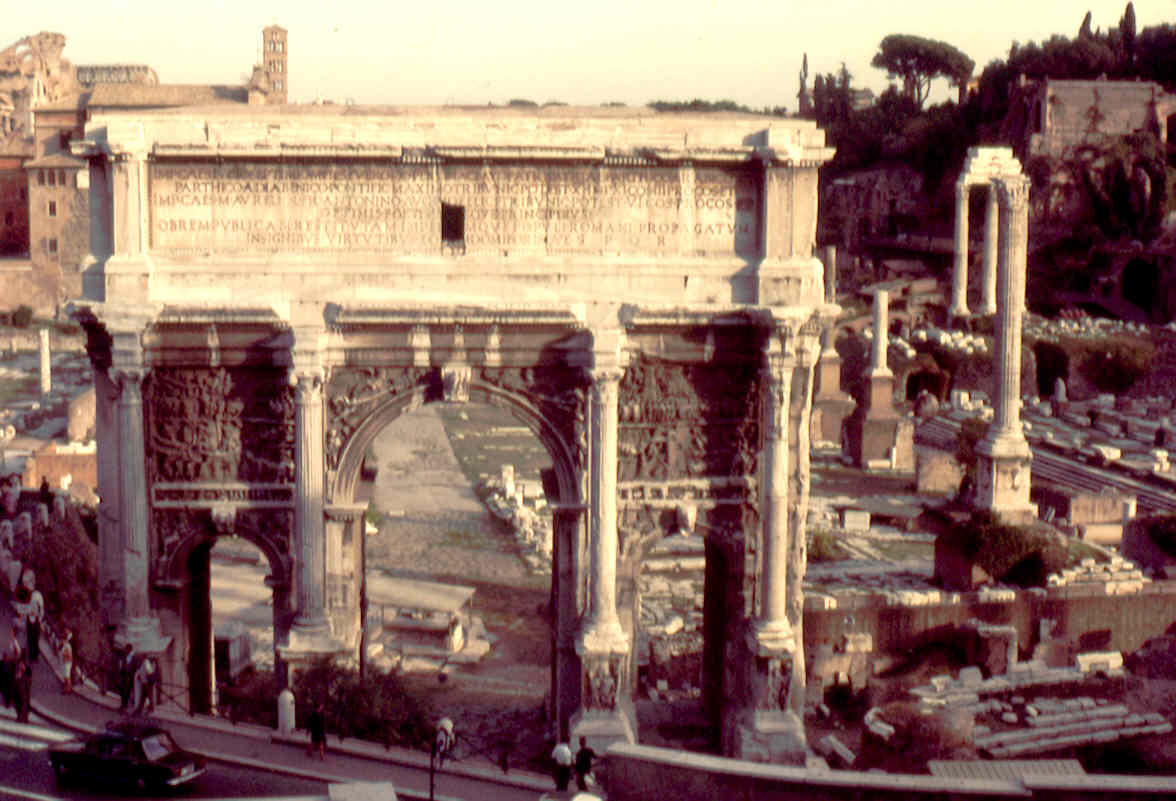
The Roman
Forum
Miles Hodges
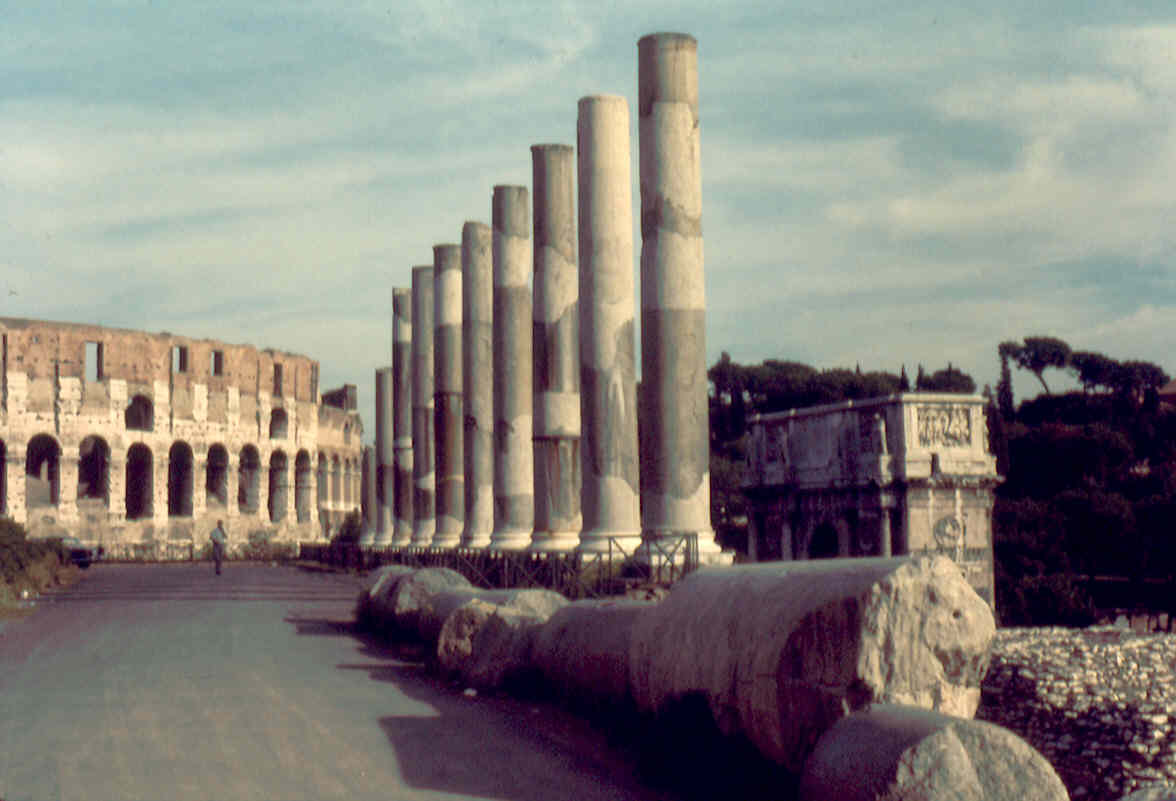
The Approach to the Coliseum
from the Roman Forum
Miles Hodges
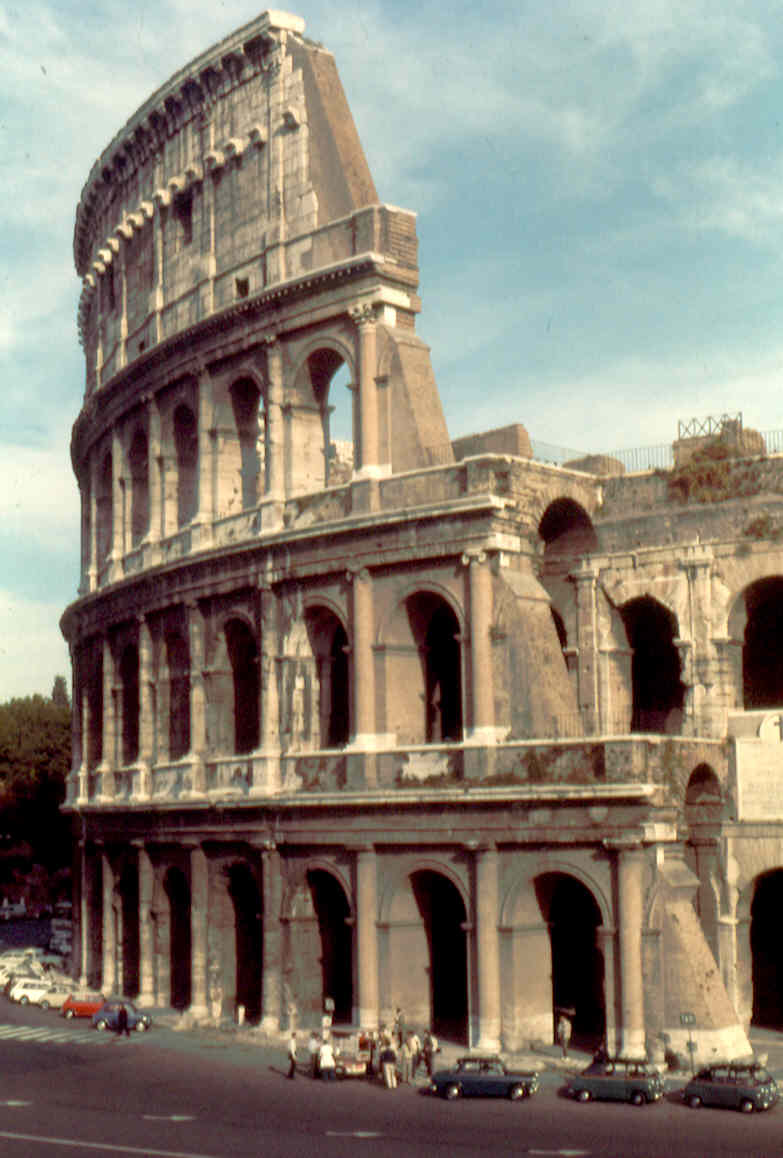
The Coliseum, Rome – (AD
70-80)
Miles Hodges
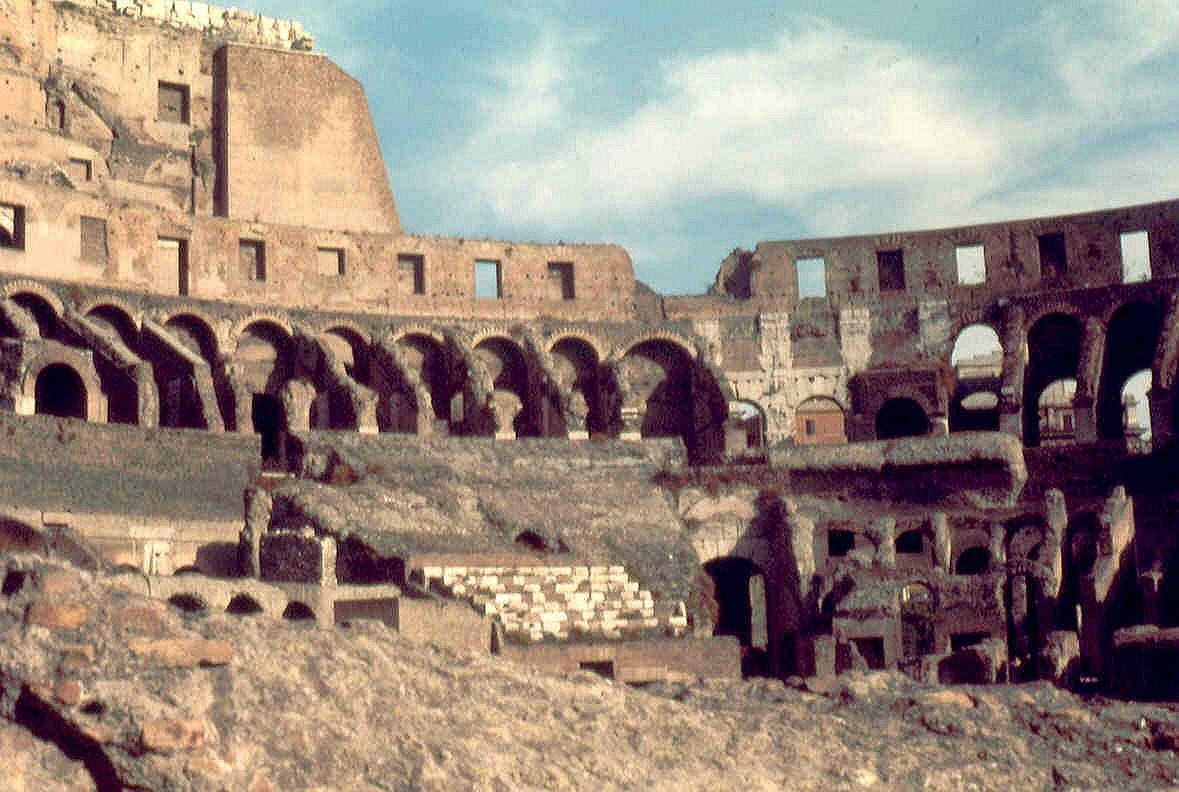
The interior of the
Coliseum
Miles Hodges
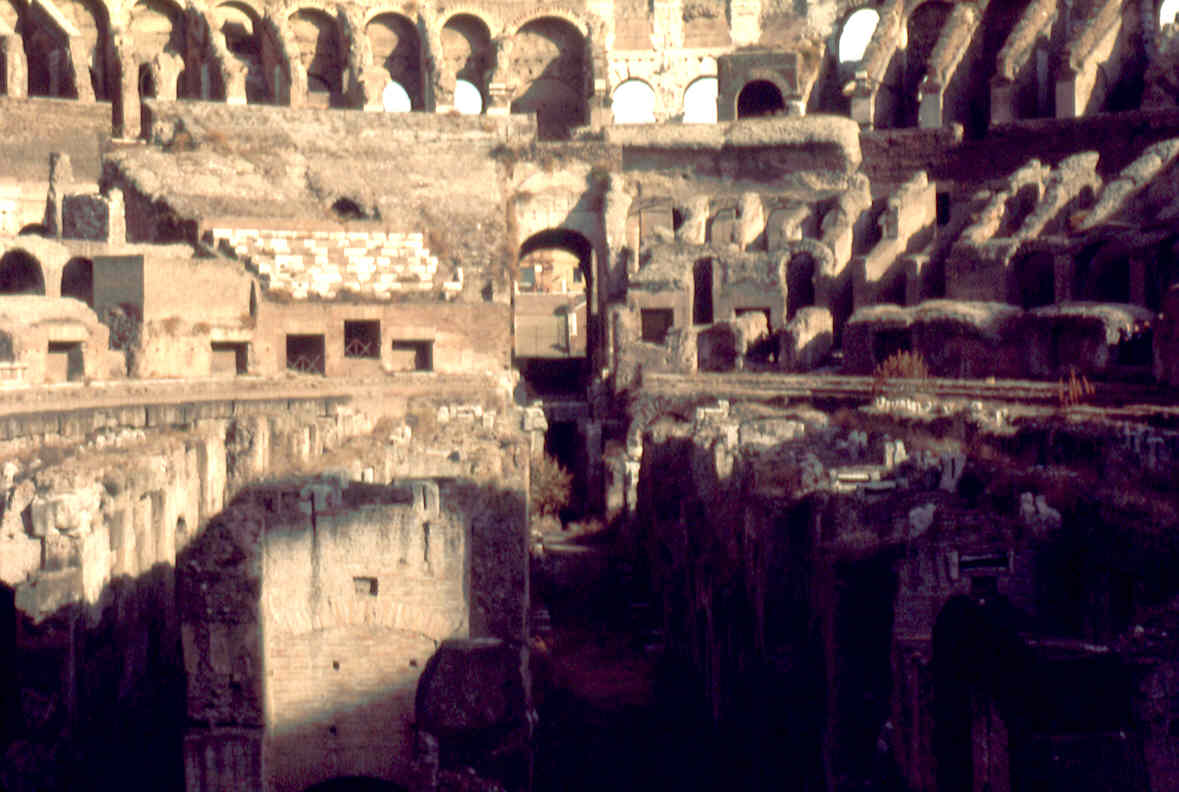
The interior of the
Coliseum
Miles Hodges
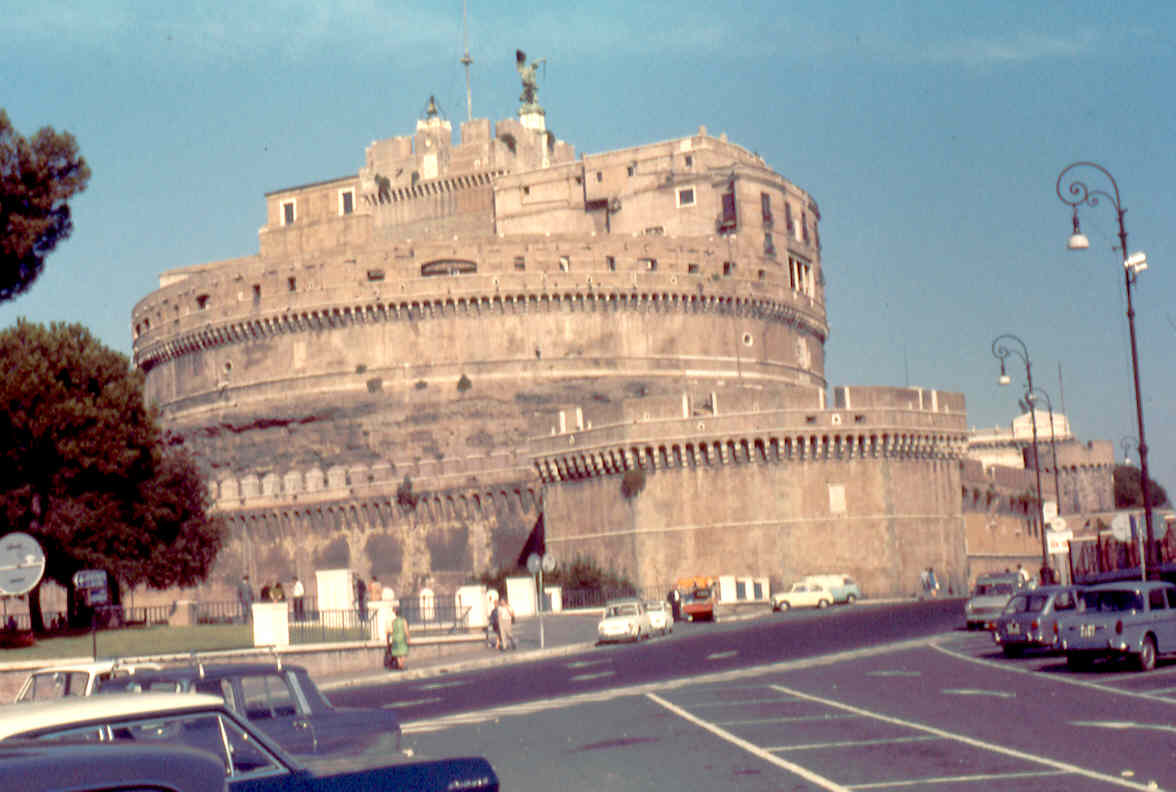
Hadrian's Tomb
Miles Hodges
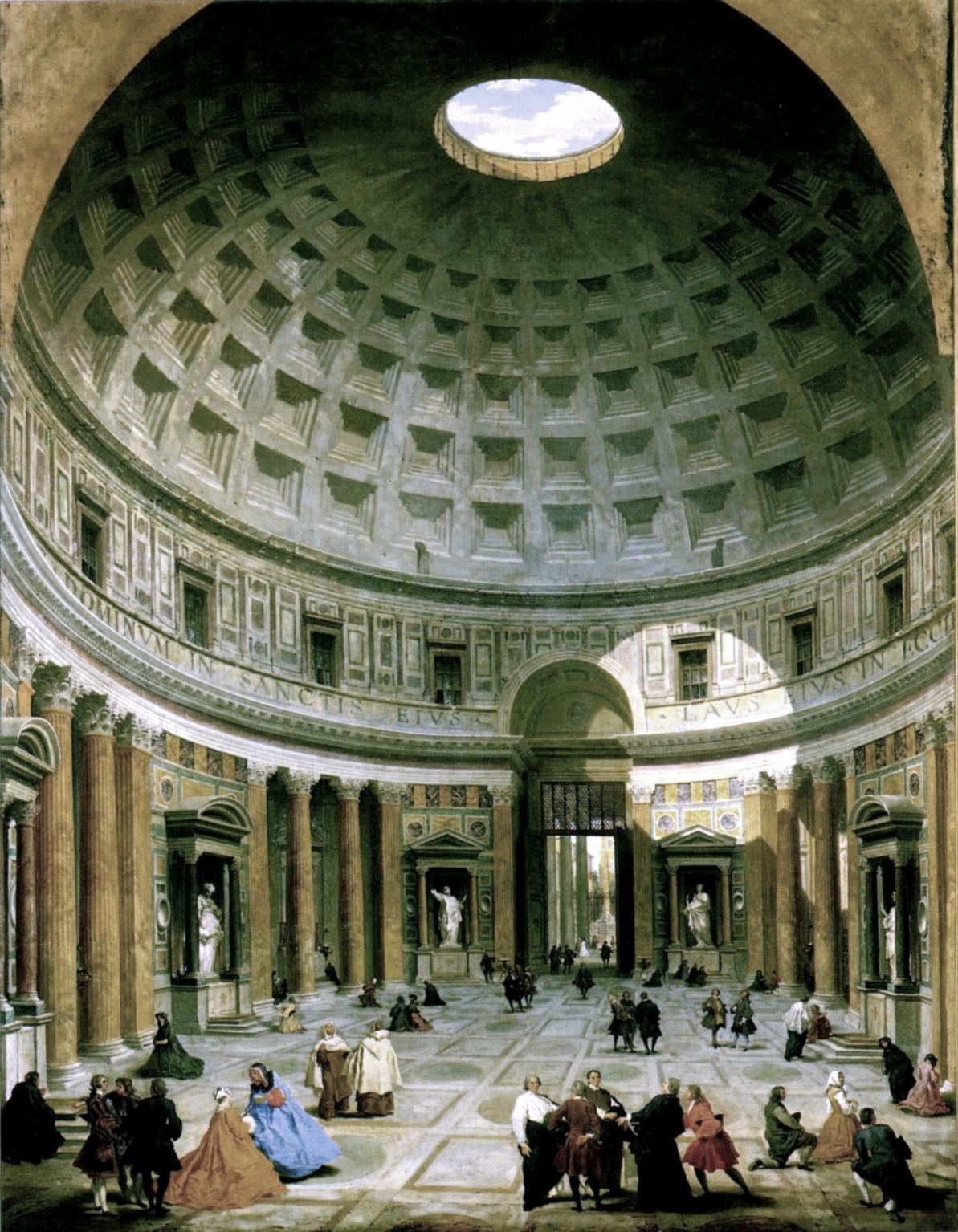
Interior of the Pantheon,
Rome – painting by Giovanni Paolo Panini (early 1700s)
Erected in 17 BC; destroyed
by fire in AD 80; reconstructed by Hadrian in AD 123

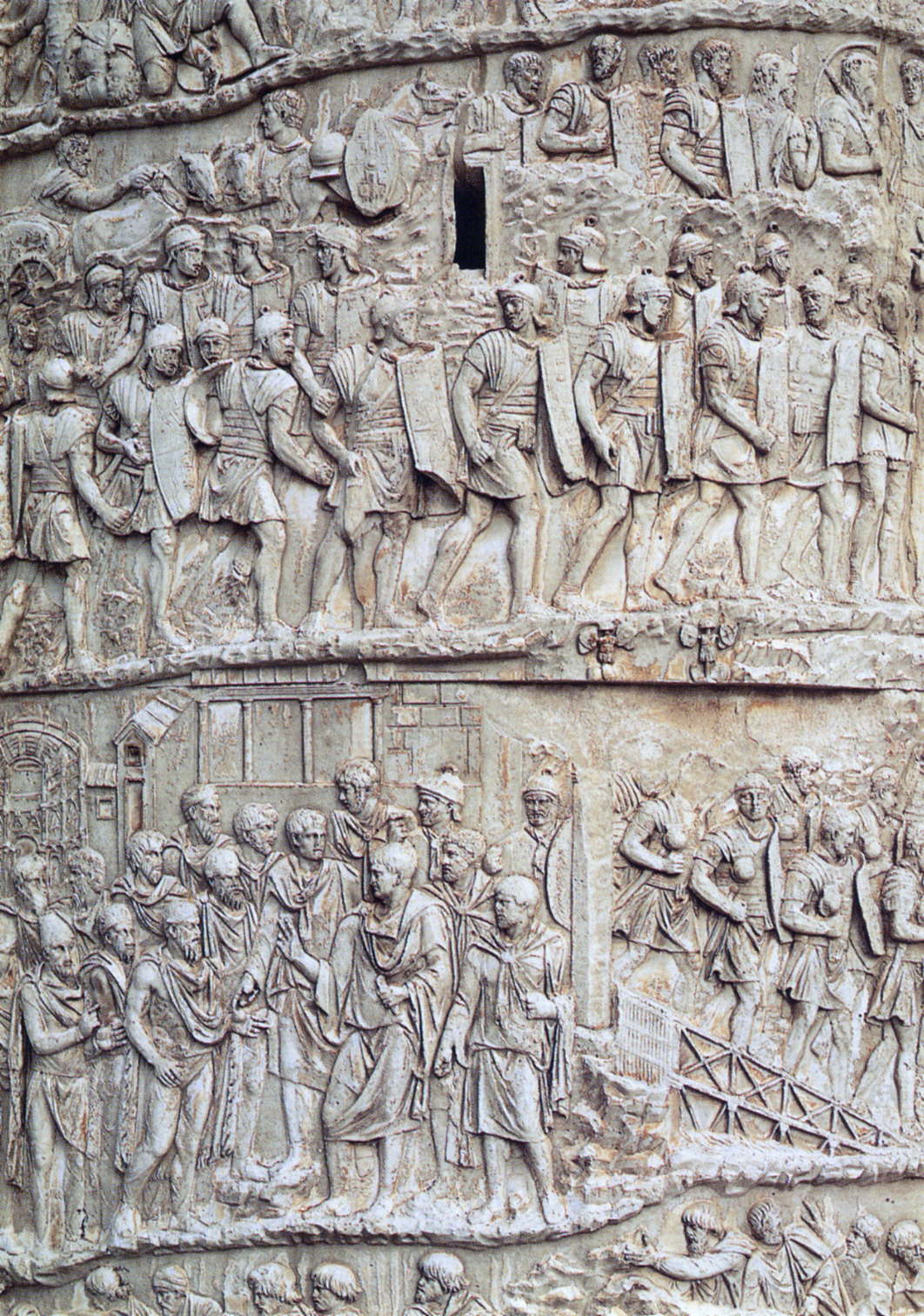
Trajan's column (and detail)
— (AD 107-113) marble
Pompeii: A town frozen in time
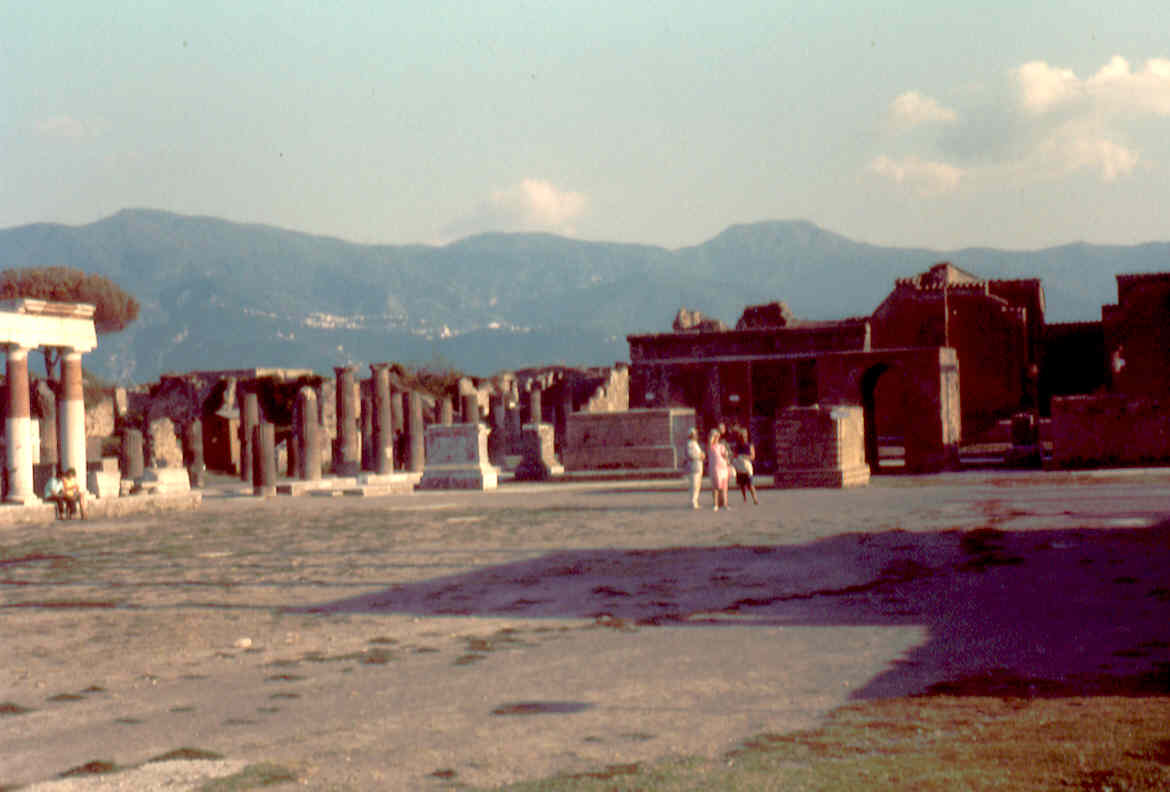
Pompeii
Miles Hodges
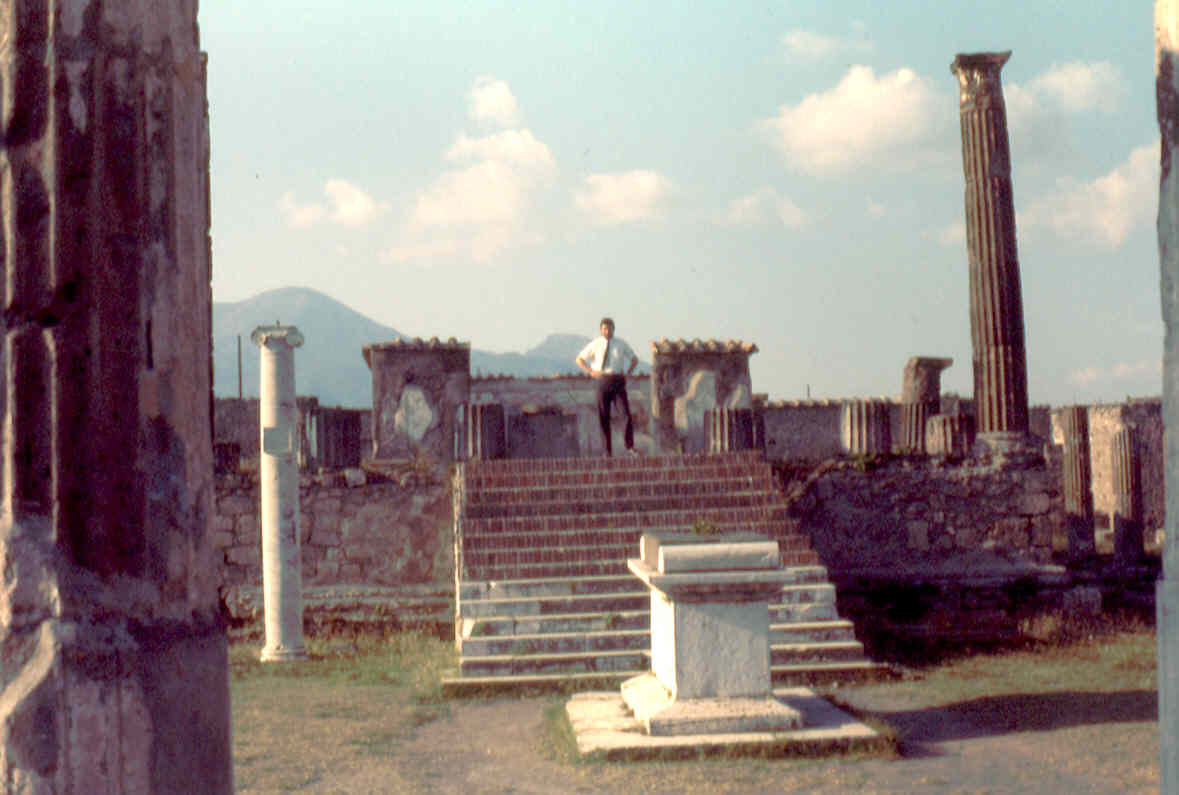
Me ... at the entrance to
the Temple of Apollo – Pompeii
Miles Hodges
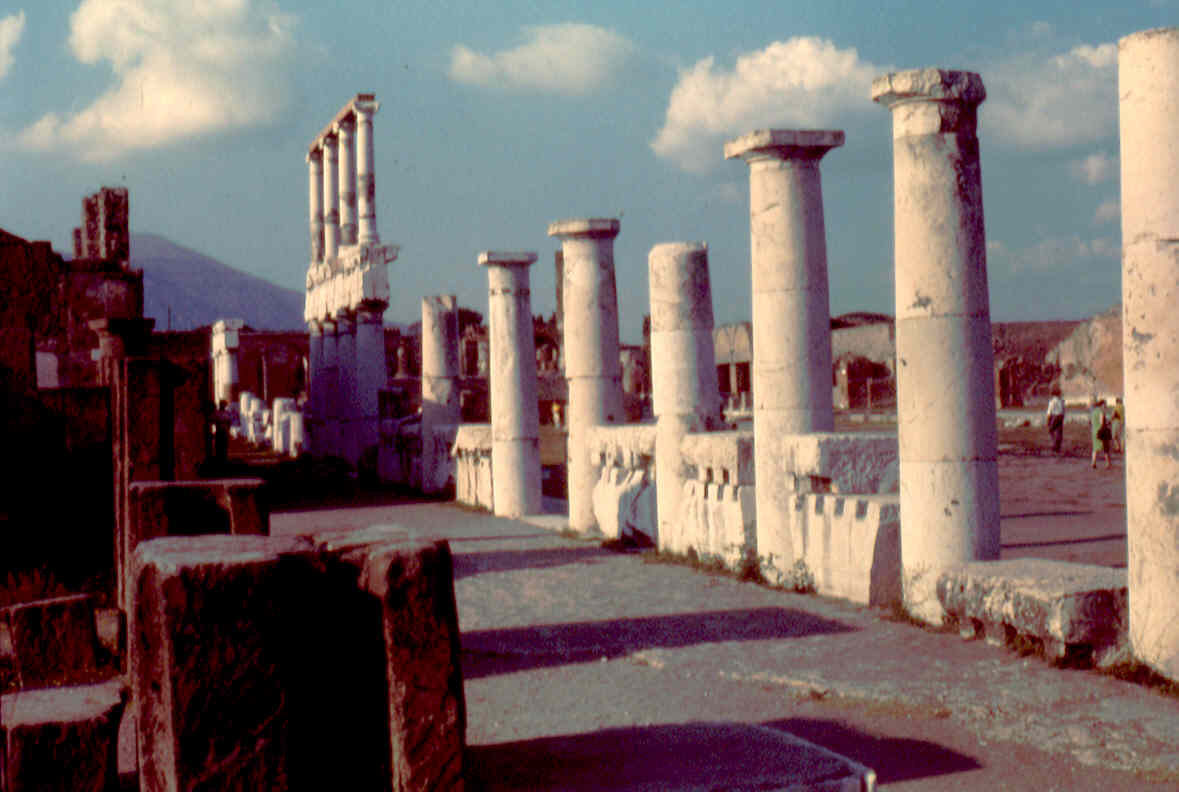
Pompeii
Miles Hodges
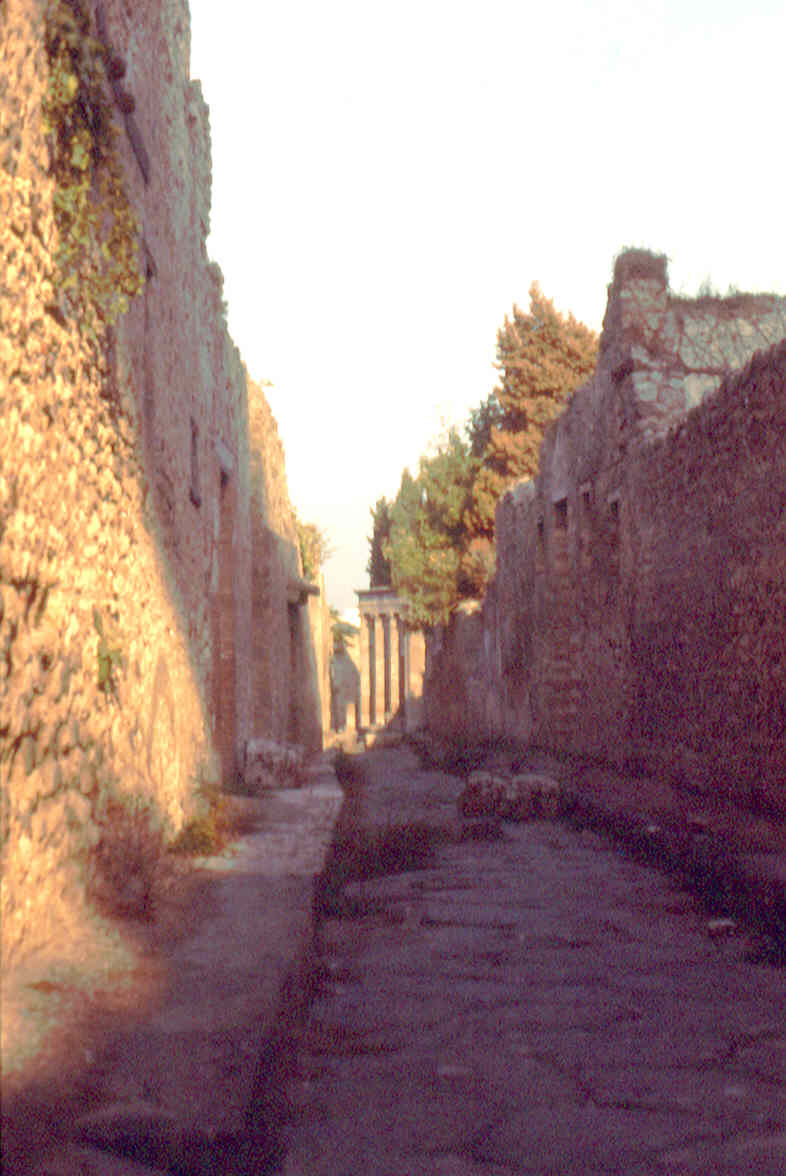
Pompeii
Miles Hodges
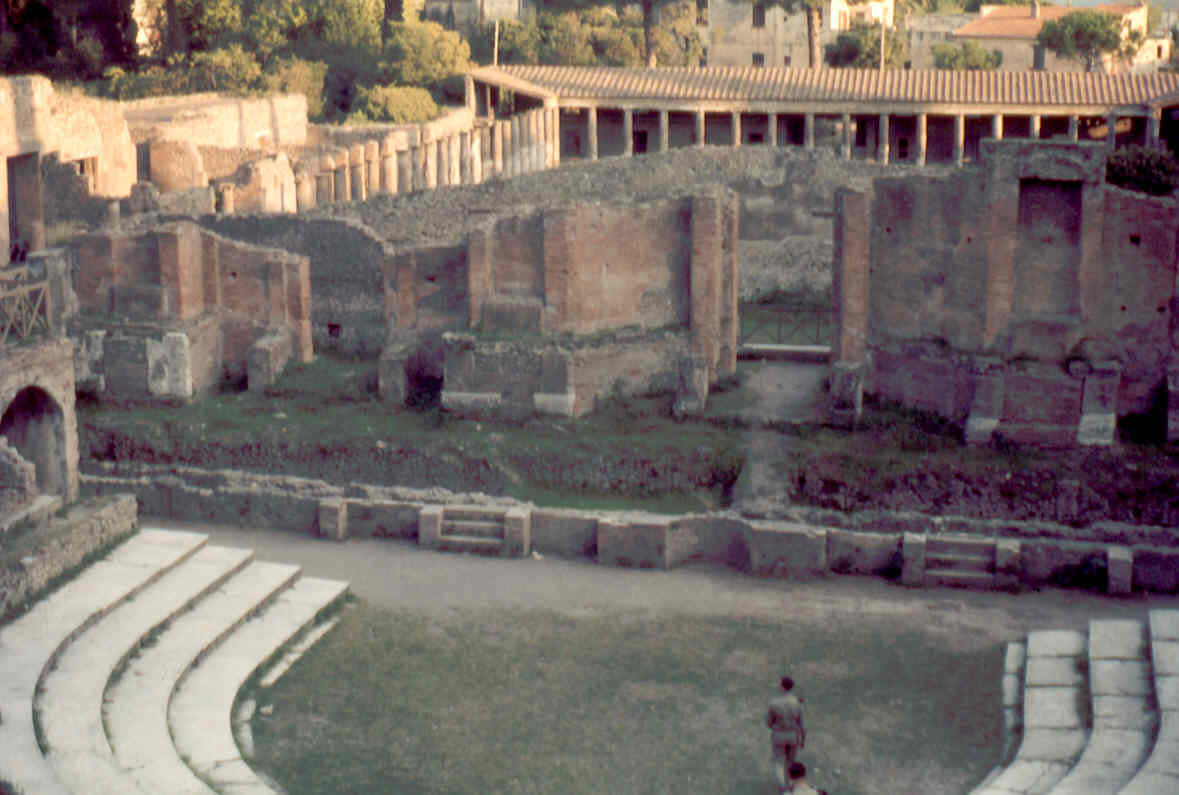
Pompeii
Miles Hodges
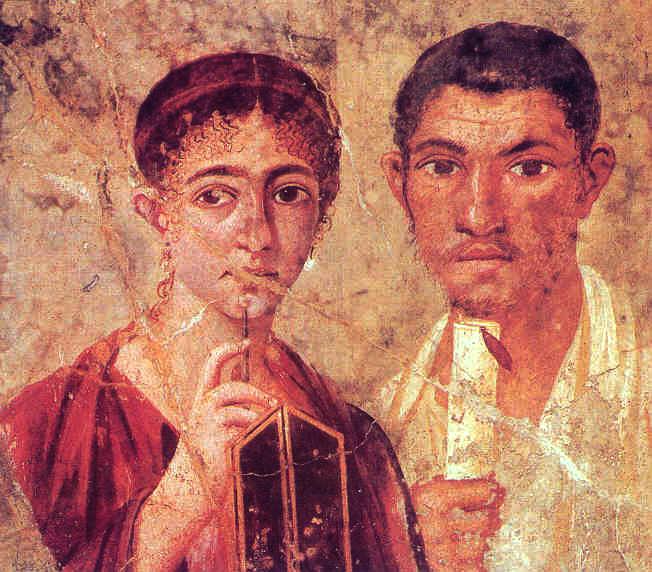
Pompeii – wealthy,
educated
husband and wife ... from the house of Julia Felix
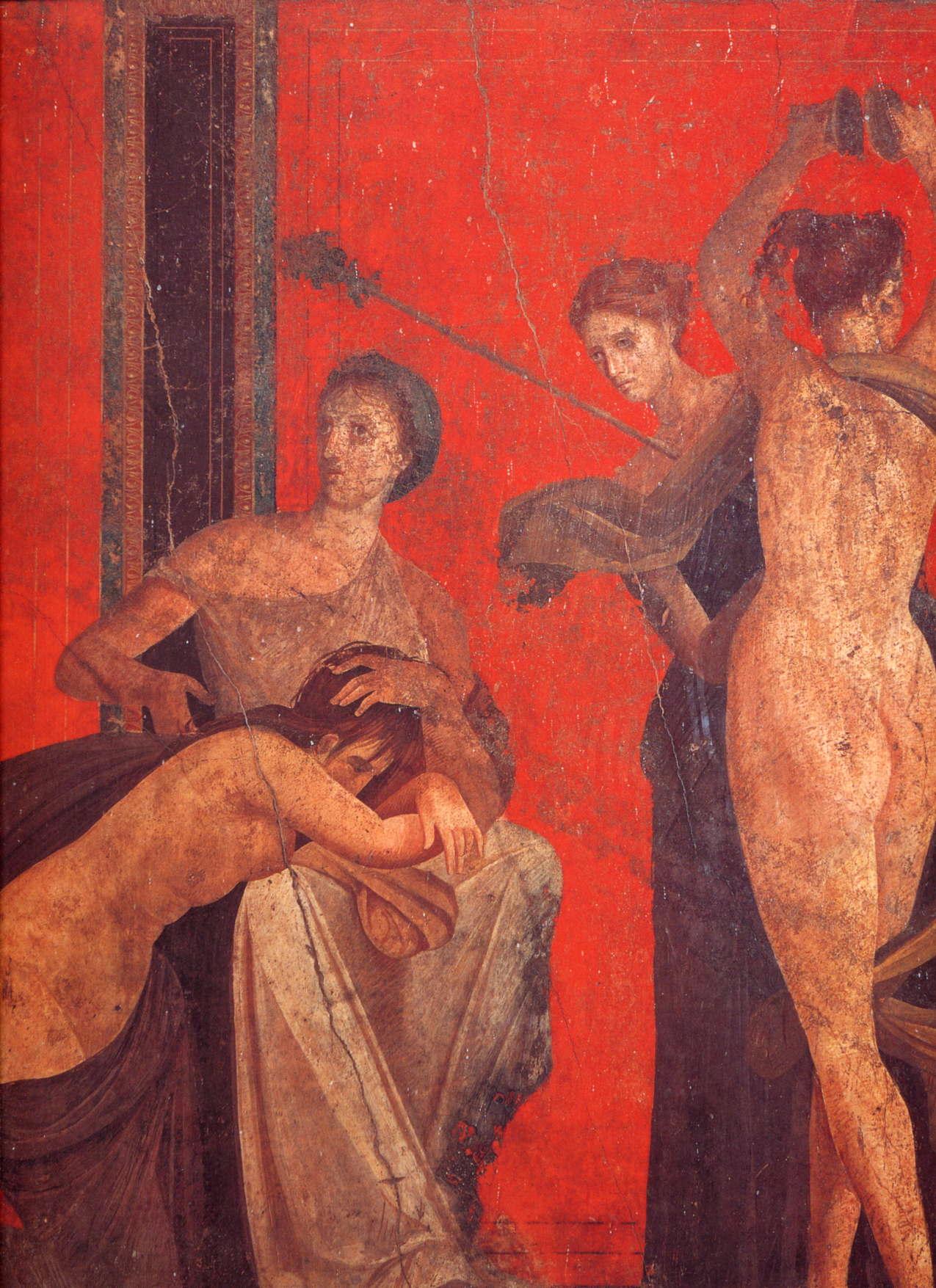
Dionysiac Mystery Frieze – Detail of Second Style wall painting (c. 50 BC)
Pompeii, Villa of the
Mysteries
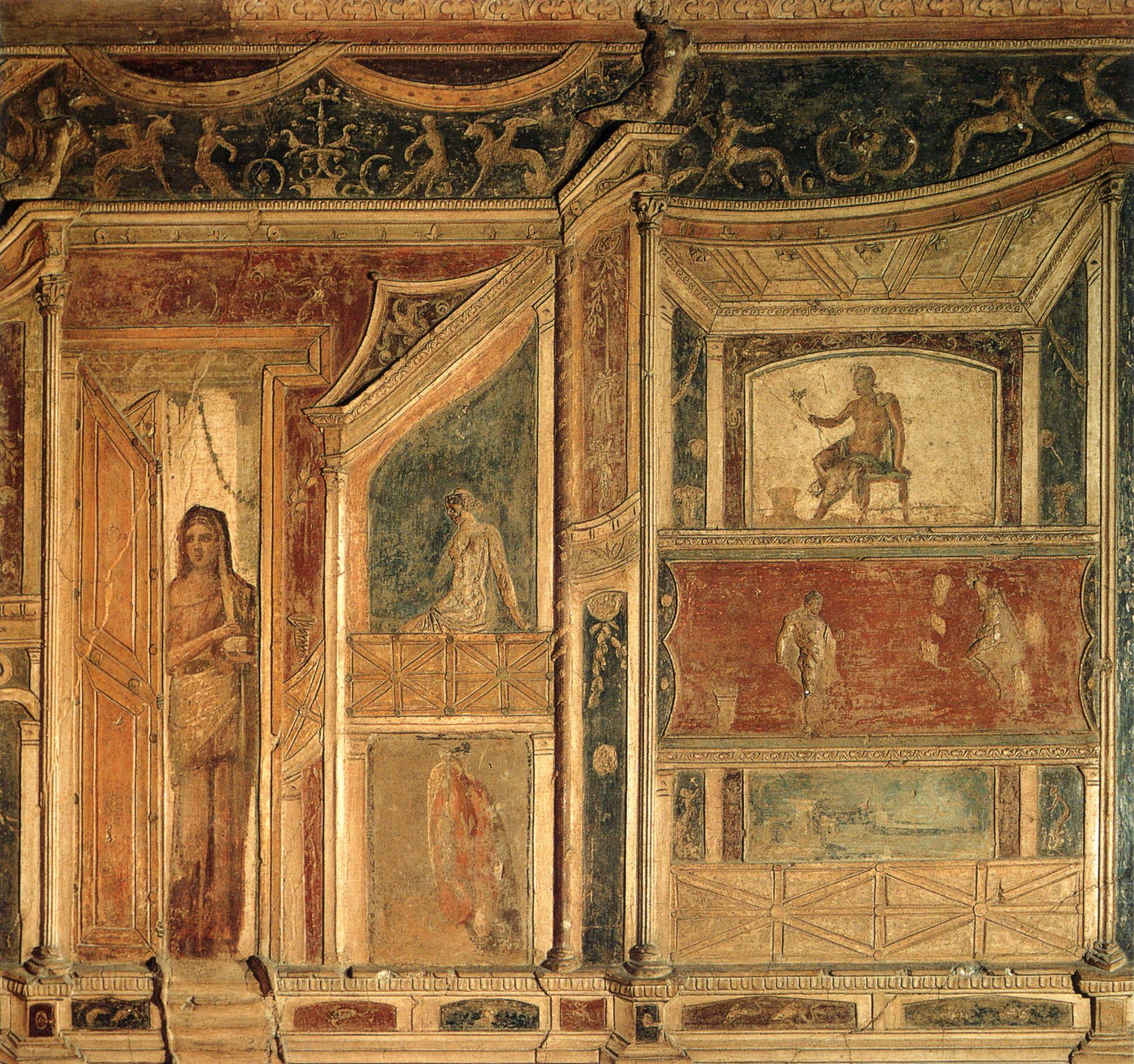
Boscoreale (50 BC)
fresco
Naples, Museo
Archeologico
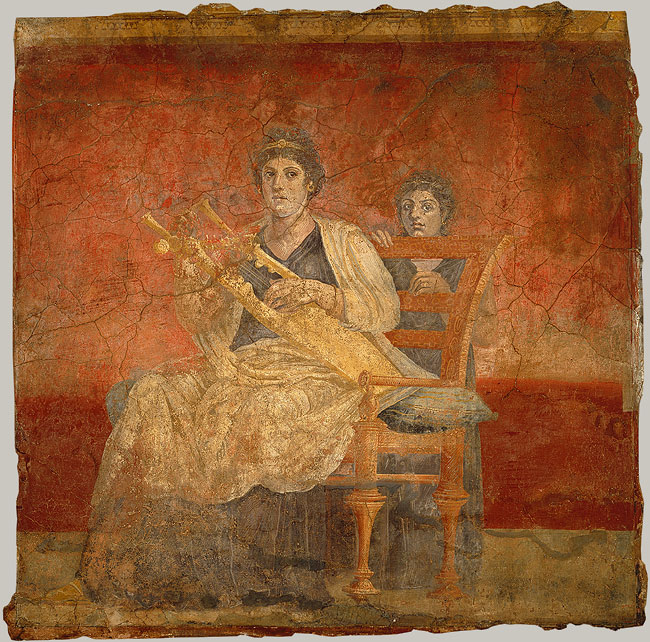
Boscoreale - Woman playing
a kithara (50 BC) fresco
New York, The Metropolitan
Museum of Art
The further reaches of the Roman Empire
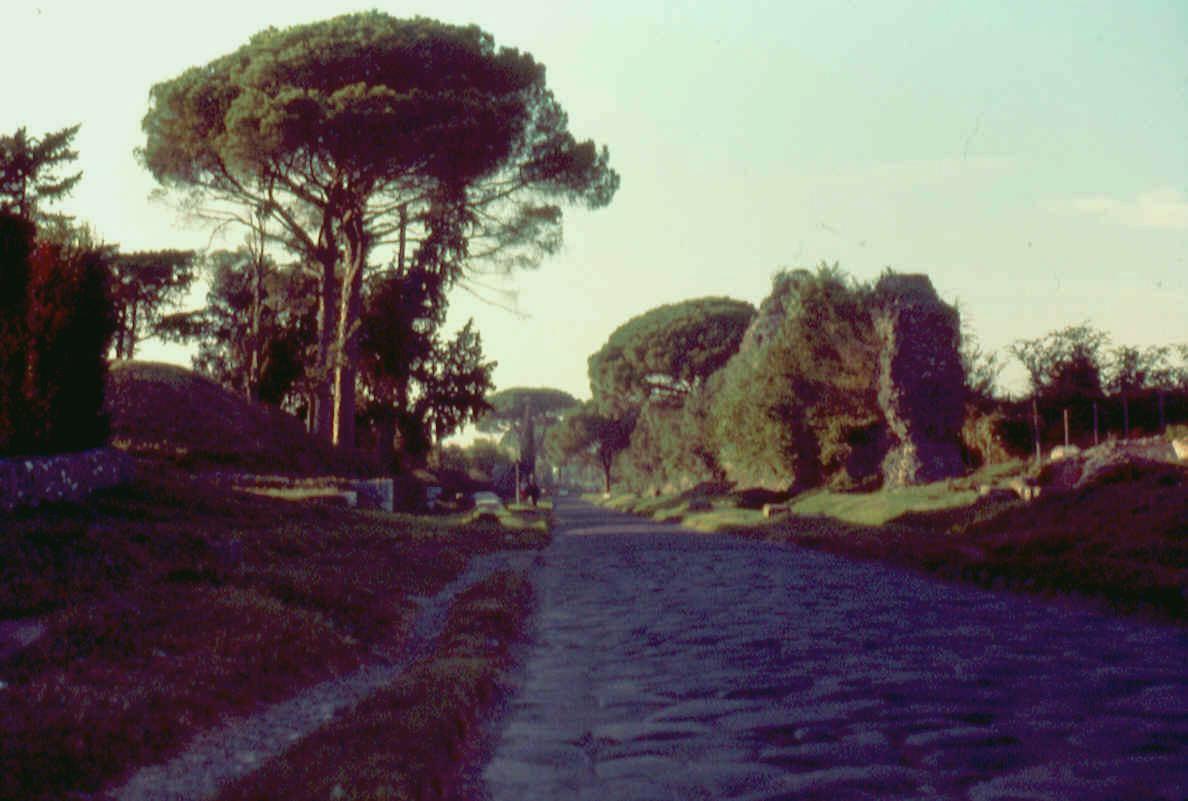
Heading south from
Rome on
the Appian Way (Via Appia)
Miles Hodges
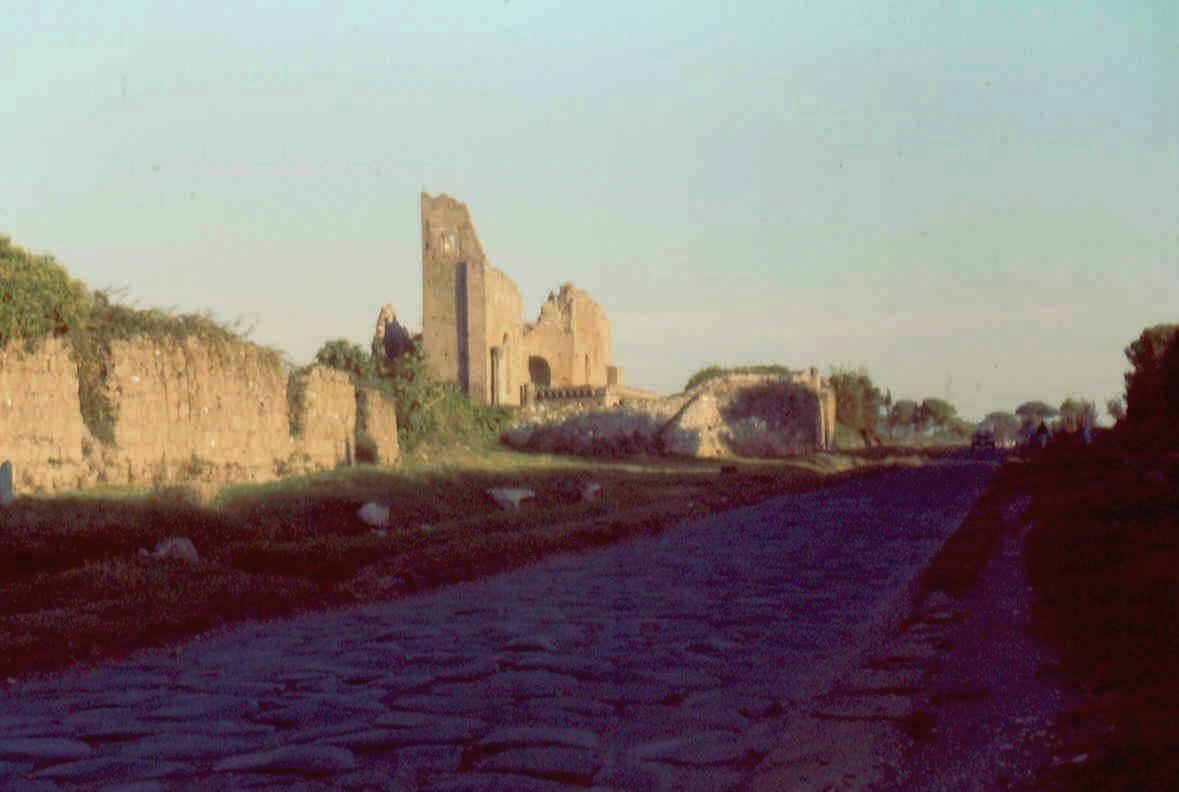
The Appian Way
Miles Hodges Corinth (in Romanized Greece)
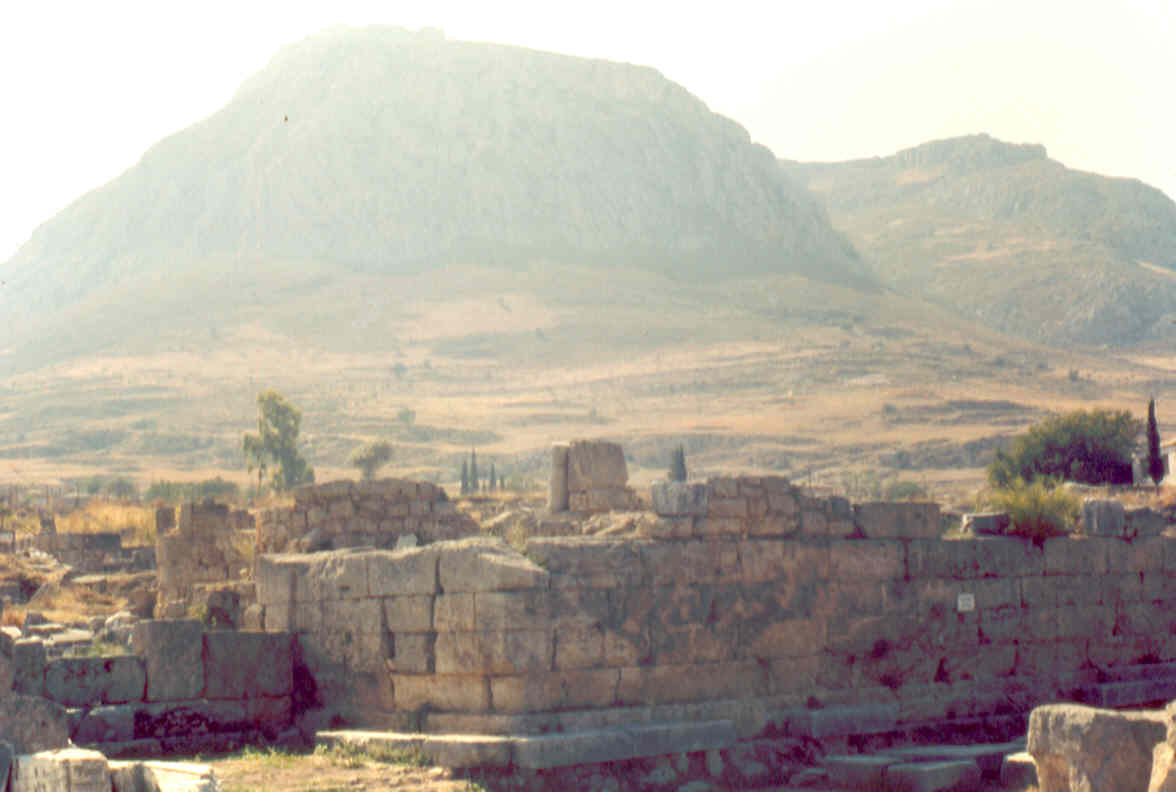
Corinth - with
its acropolis in the distance
Miles Hodges 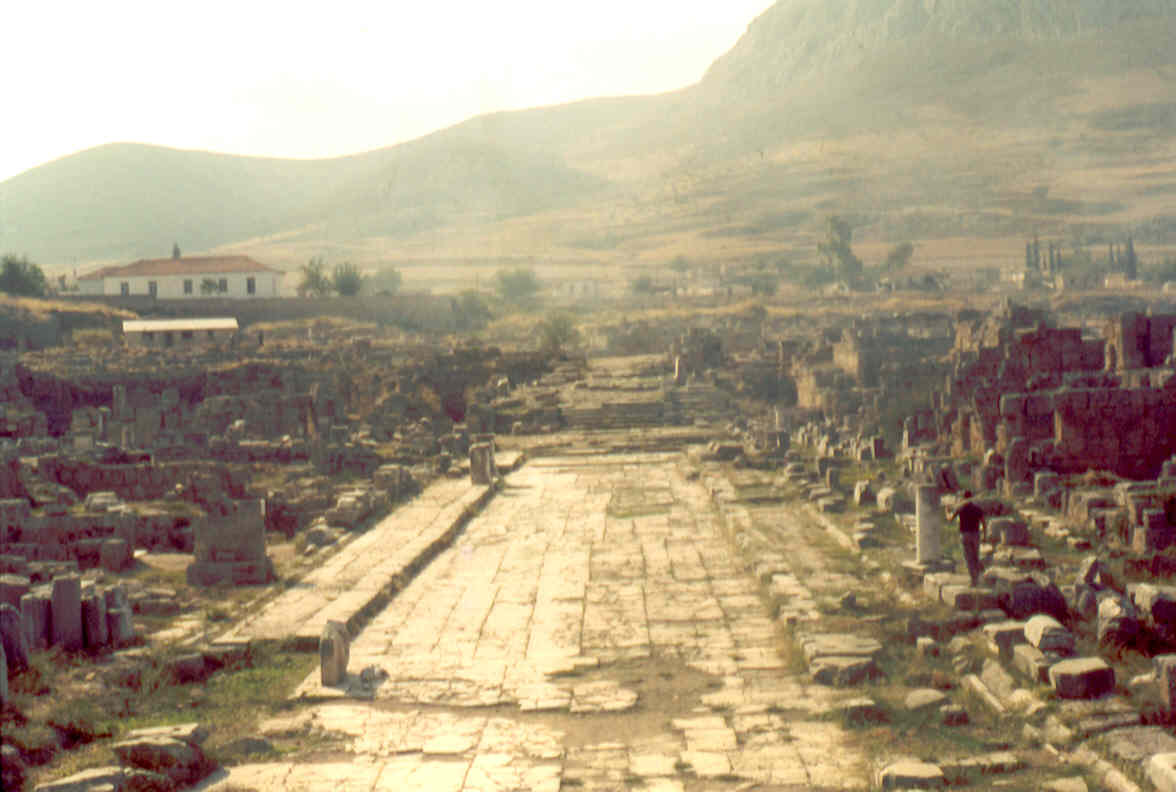
The Lechaion
Road
Miles Hodges 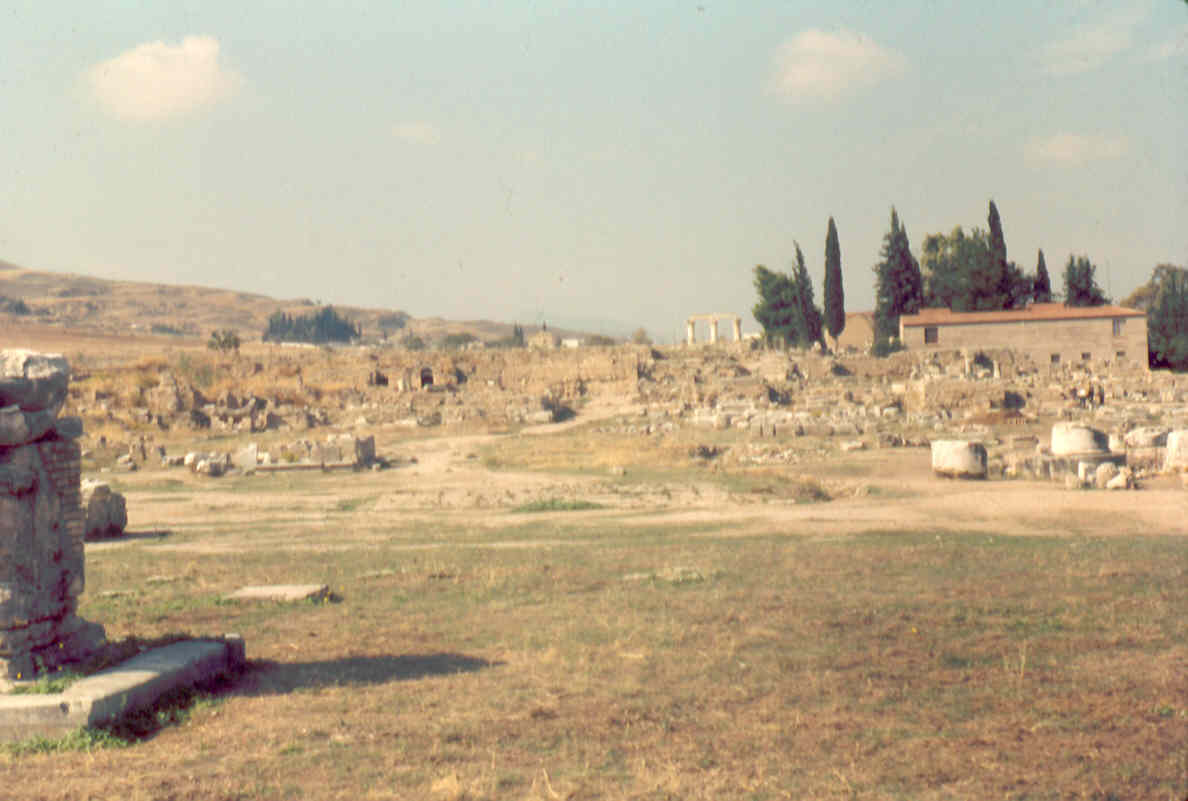
The Agora of
Corinth
Miles Hodges 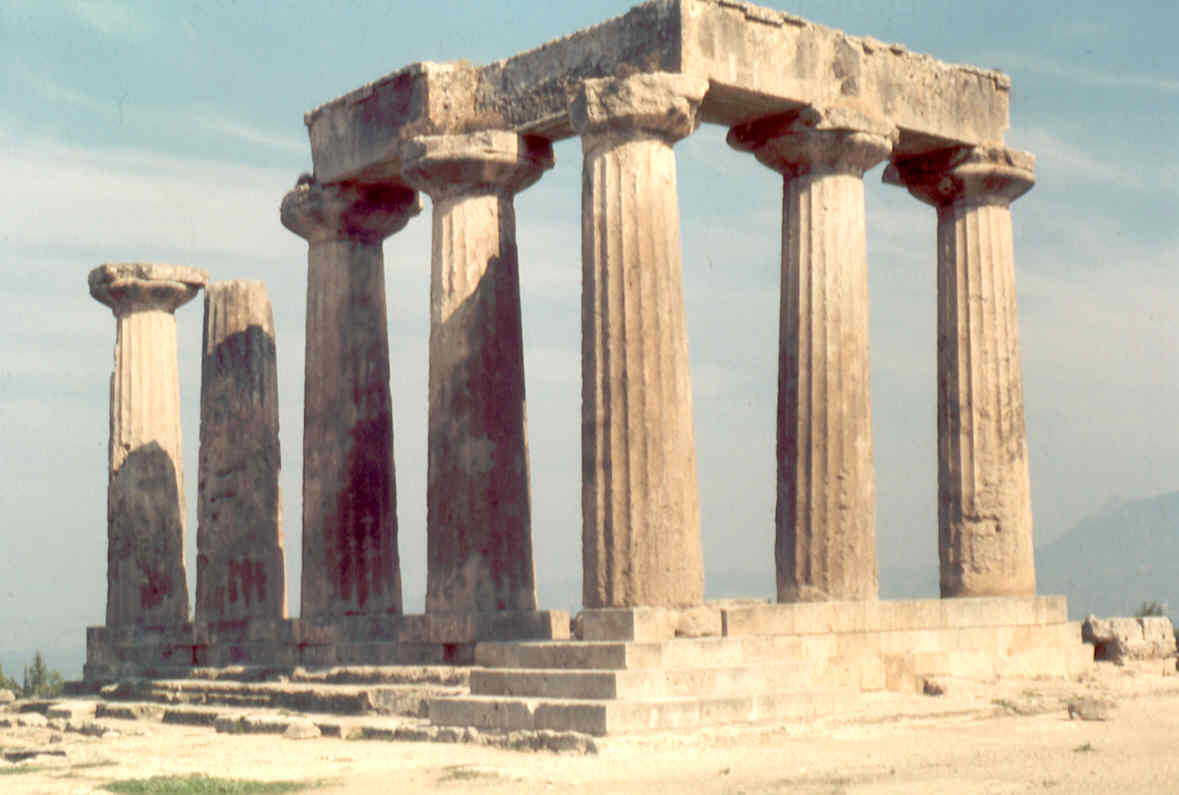
The Apollo
Temple in Corinth
Miles Hodges 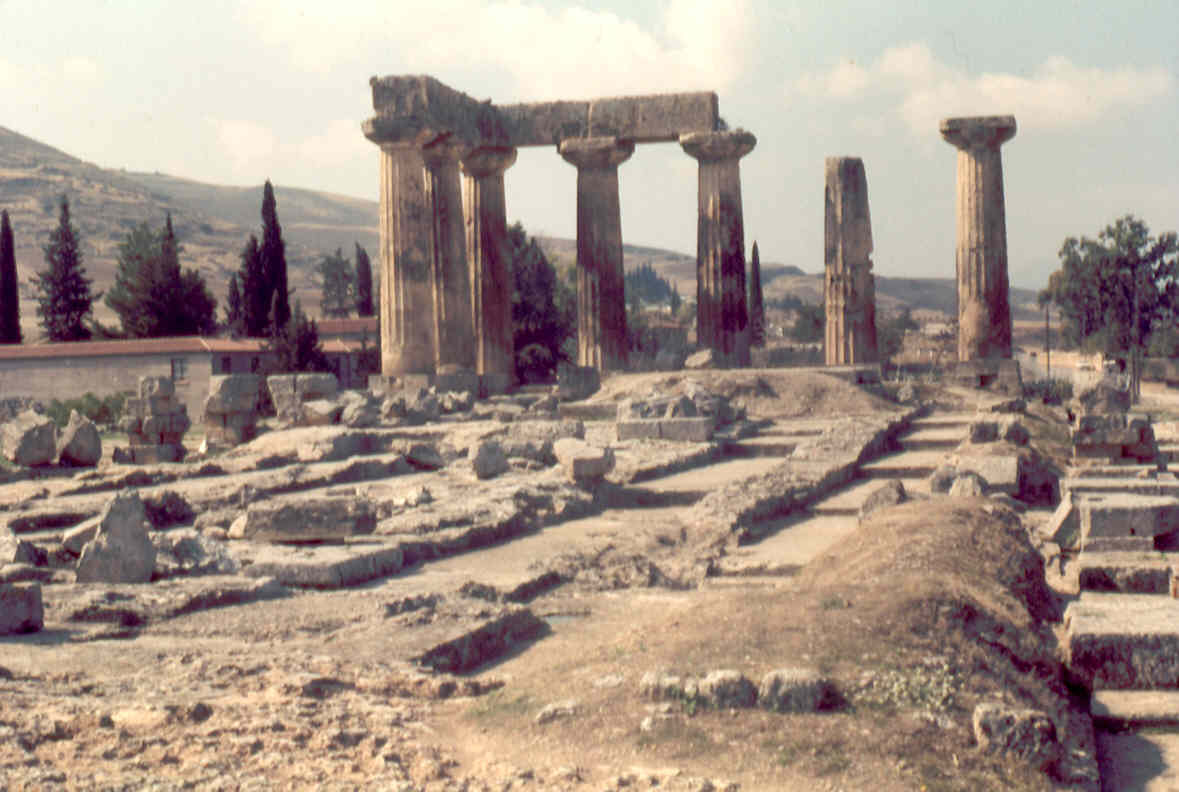
The Apollo
Temple in Corinth
Miles Hodges
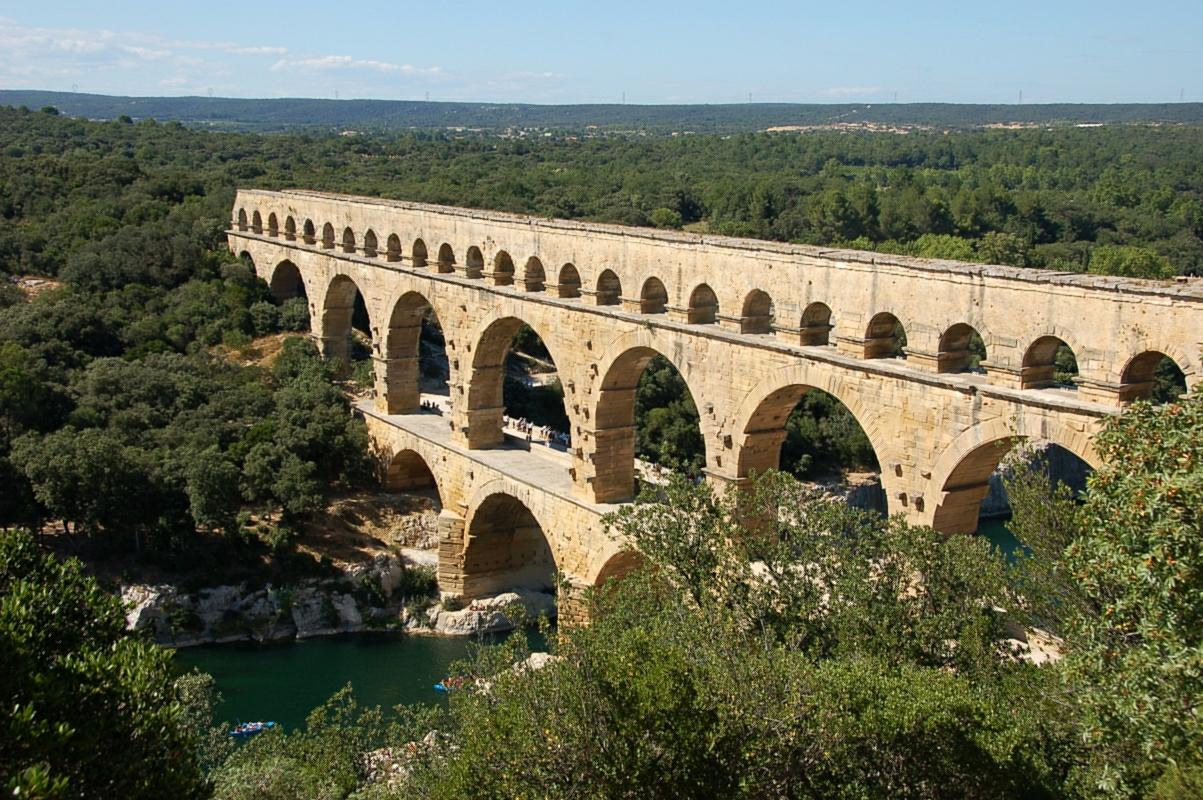
A Roman Aqueduct (the Pont
du Gard) at Nimes, France, built in the 1st century AD
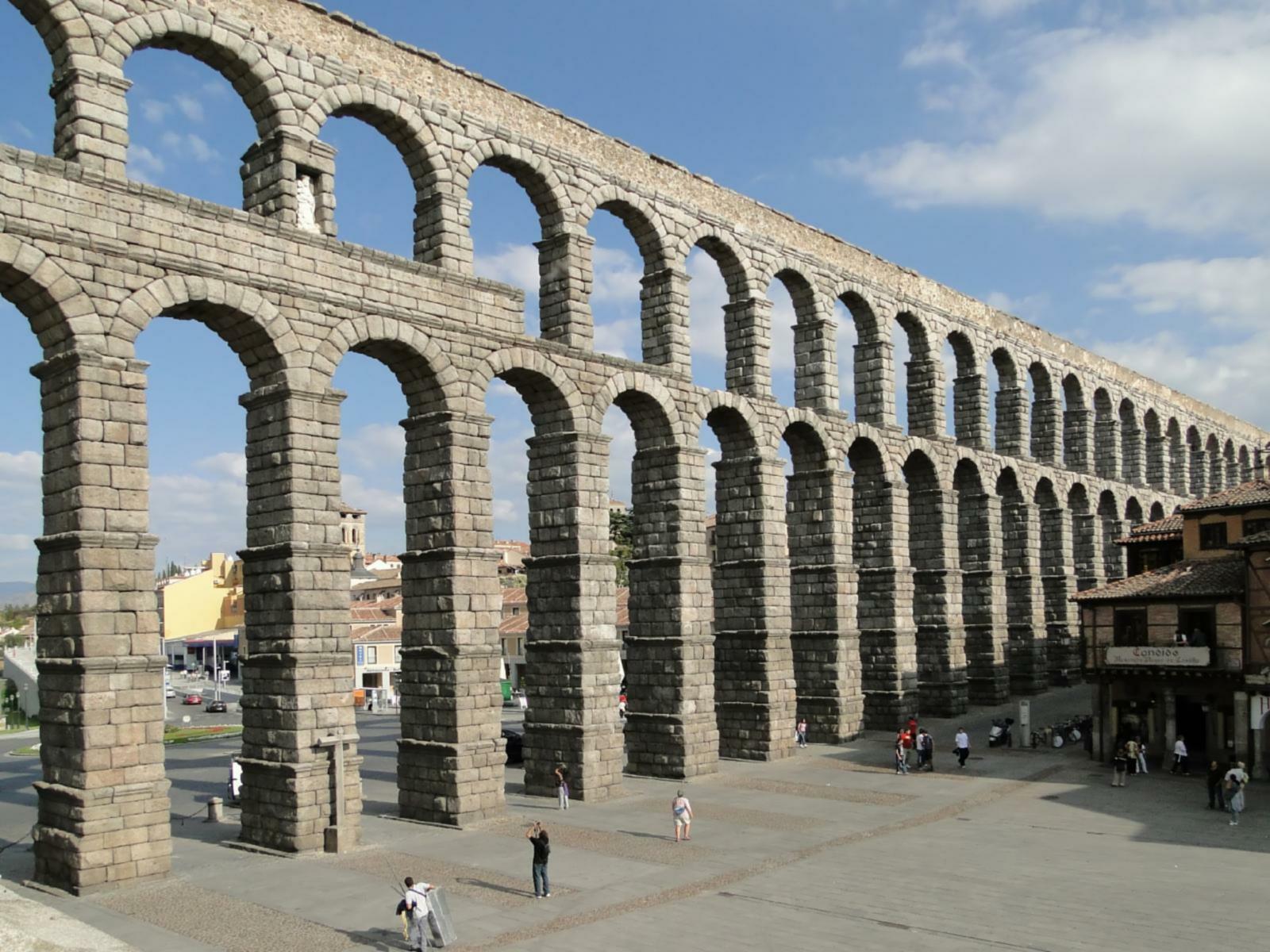
Aqueduct of Segovia, Spain
(AD 117-134)
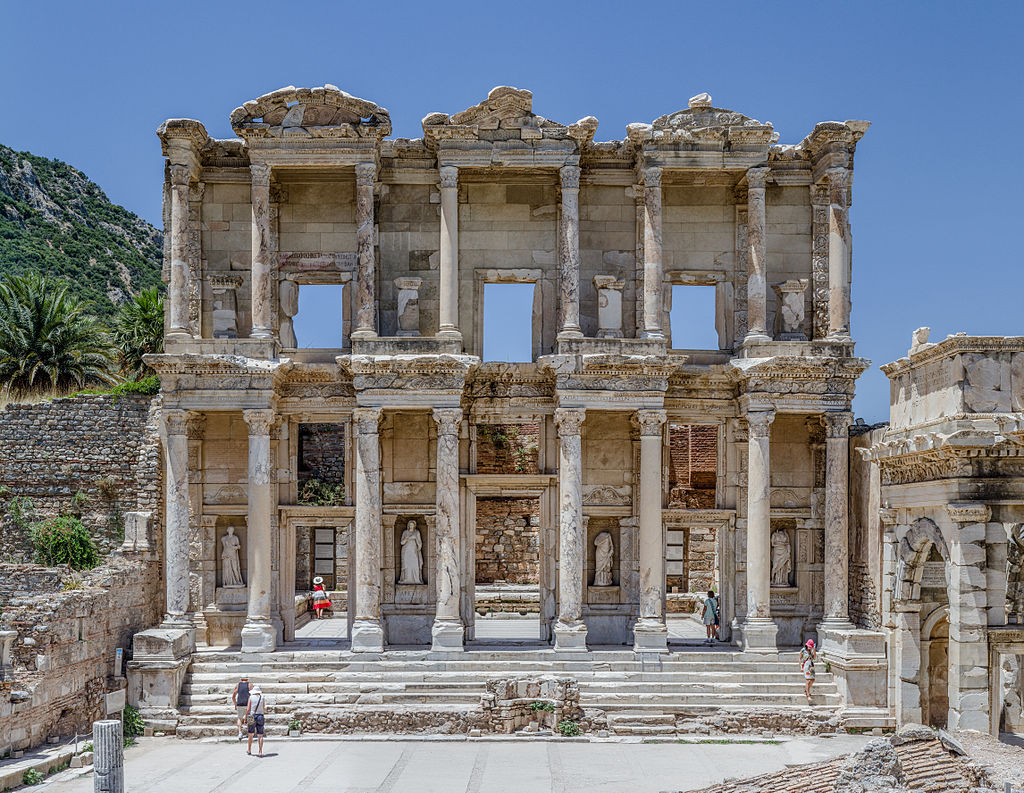
The Library of
Celsus - Ephesus (modern Turkey)
Roman Britain
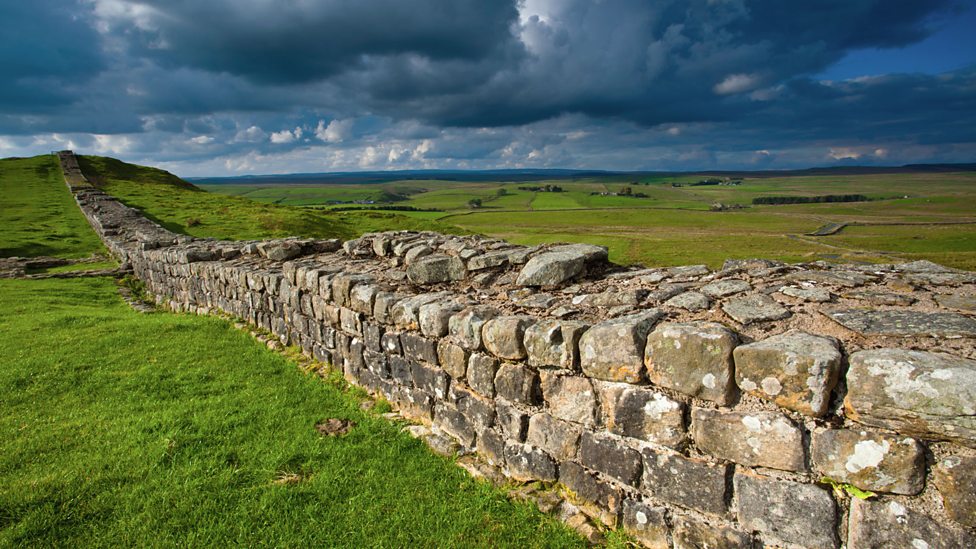
Hadrian's Wall ... designed to hold off the Picts and Scots from Roman Britain 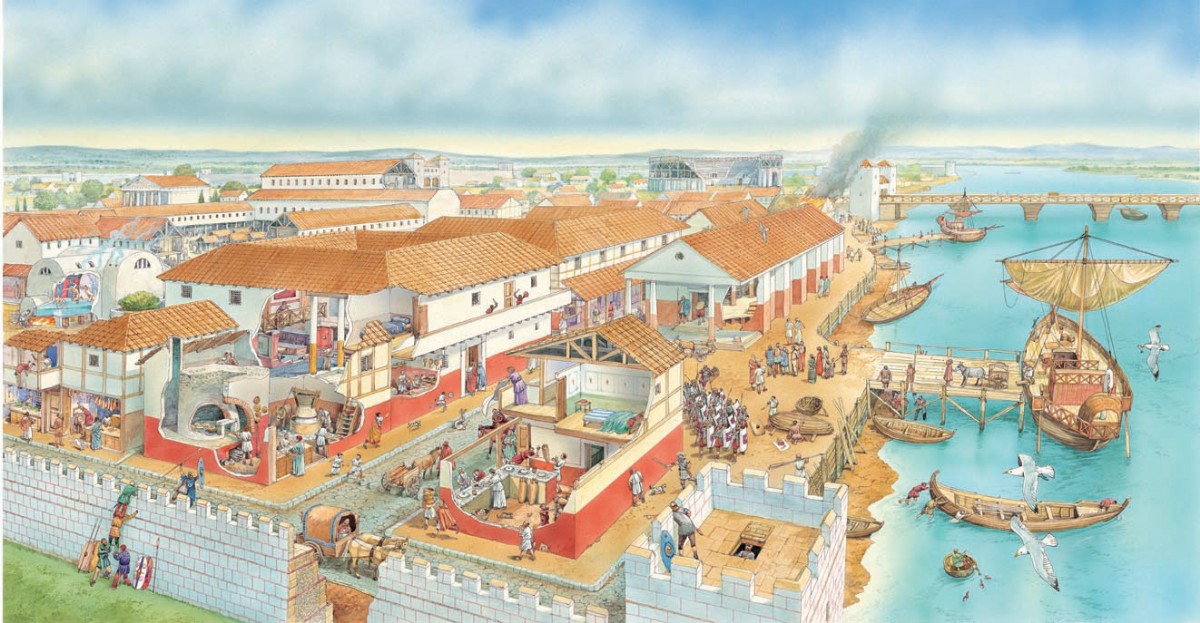
Typical fortified urban life in Roman Britain
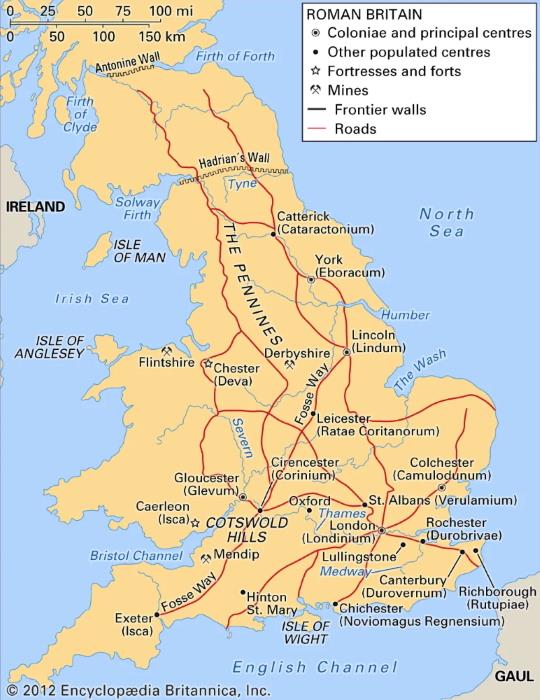
Map of Roman Britain
Encyclopedia Britannica

Go on to the next section: The Israelites/Jews
 Miles
H. Hodges Miles
H. Hodges
| | | | | | |


 The birth of imperial Rome
The birth of imperial Rome
 The height of the Roman Imperium
The height of the Roman Imperium
 The intellectual culture of the Roman
The intellectual culture of the Roman The decline of the Roman Empire
The decline of the Roman Empire
 Diocletian and the Tetrarchy (285-305)
Diocletian and the Tetrarchy (285-305)





























